#(of the two American is tragically the better airline.)
Text
pros of this job:
sometimes they pay me to fly to colorado :)
cons of this job:
sometimes they pay me to fly to colorado :(
#i don't feel like it. i've been on a plane already this year that's enough.#not only am i contributing to horrible air pollution but i am not even going to have fun. i'm gonna work the whole time. UGH.#and all the flights to that tiny regional airport this time of year are horrific. overcrowded and poorly timed. just really really bad.#(it's because half of the airlines that service that airport stop coming there for half the year)#(everyone has to cram onto either an American flight at 7:30 in the morning or a United flight at 10:30 at night)#(of the two American is tragically the better airline.)#this one was a last minute flight too so it's extra bad. i only just today got the dates and booked the flight and it's in like 3 weeks.
0 notes
Photo
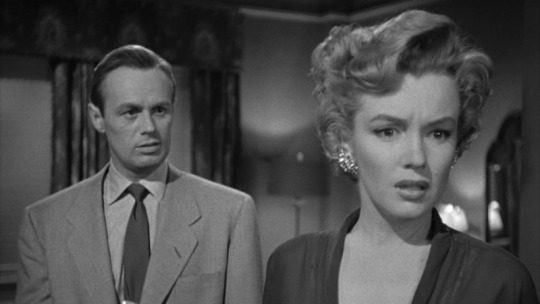
Don’t Bother to Knock (1952)
On social media, there are certain actors from Golden Age Hollywood whose imagery, on occasion, seeps through the Internet’s algorithmic modern biases. Too often, those posts are from individuals who have never seen such actor’s movies. Chief among those actors are James Dean, Marlon Brando, Audrey Hepburn, and Marilyn Monroe. Against the grain, I hold that James Dean’s posthumous legacy has overshadowed three performances I am no fan of and Brando’s airbrushed reputation leaves him overvalued in the popular written histories of American cinema. By contrast, Audrey Hepburn’s standing in modern times feels just about correct (although more people should seek out her films beyond 1953’s Roman Holiday and 1961’s Breakfast at Tiffany’s). For Marilyn Monroe, a recent film like Andrew Dominik’s Blonde (2022) follows decades of works that have exploited her image – oftentimes simplifying her to a tragic sex symbol. Monroe, of the four aforementioned Old Hollywood actors who show up from posts from non-film buffs, is the only one whose talents I consider underrated.
There is no better showcase of her early-career dramatic abilities than in Roy Ward Baker’s film noir Don’t Bother to Knock, released by 20th Century Fox. Up to this point, Monroe had starred in more than a dozen films in supporting roles. In a time when actors and film crewmembers were contracted to a studio, Fox loaned Monroe early in her career to Columbia, Metro-Goldwyn-Mayer (MGM), and most recently to RKO. Fox executive Darryl F. Zanuck was still not entirely sure what to make of her, despite a strong performance in RKO’s Clash by Night (1952). Offering Monroe the lead role in Don’t Bother to Knock, Zanuck gave her the opportunity to prove herself (in addition to ascertaining British director Roy Ward Baker’s skills for his first Hollywood picture). Wary of the risks of pushing an actress to her first lead role as well as working with an unfamiliar director, Zanuck allowed a budget that, by Fox’s standards in the early ‘50s, was a trifle. Yet, because of these limitations, Don’t Bother to Knock is a decent noir and a solid Marilyn Monroe vehicle.
One night in a New York City hotel, airline pilot Jed Towers (Richard Widmark, one of Fox’s brightest stars at this time) approaches his ex-girlfriend Lyn Lesley (Anne Bancroft in her film debut), the hotel club’s singer. Lyn broke up with Jed recently by letter, and explains to her ex that her reasoning is due to his attitude. Jed, flustered, heads back to his room. On the same floor Jed is on but across the air shaft, elevator operator Eddie Forbes (noir mainstay Elisha Cook Jr.) introduces his niece Nell (Marilyn Monroe) to guests Peter (Jim Backus) and Ruth Jones (Lurene Tuttle). Nell will serve as babysitter to the Jones’ daughter, Bunny (Donna Corcoran), while the couple attend a reception downstairs. All is set in motion when Jed first sees Nell across the way.
Also in the cast is Don Beddoe as Mr. Ballew. And Disney fans might recognize Verna Felton – the Elephant Matriarch in Dumbo (1941) and the Fairy Godmother in Cinderella (1950), among others – playing Mr. Ballew’s meddling wife, Emma.
Don’t Bother to Knock’s categorization as a film noir comes from its storyline, rather than its visuals. Bar one scene involving Jed believing someone on the other side of the room to be asleep, the film lacks the shadowy aesthetic one comes to expect from noir. Shot and lit conventionally, Don’t Bother to Knock never quite escapes the fact it is obviously soundstage-bound. The small number of different locations for the film’s various scenes also does not help matters. From a perspective of style, this is a disappointing effort from cinematographer Lucien Ballard, who had ample experience in film noir by this point – see The Lodger (1944) and The House on Telegraph Hill (1951) in this collaboration with Baker.
Yet it is the two central performances that elevate the material. The audience is witnessing Marilyn Monroe before sporting her platinum blonde locks. The natural brunette keeps her natural hair color for this film; not truly transforming into the Marilyn that most casual film audiences know about until Niagara (1953). Unlike the typecast dumb blonde roles that she received later in her career, her role in Don’t Bother to Knock is neurotic, restless, and wide-eyed not in a sexual way. Monroe brings a level of internal strife strewn across her face, a measured gait, and a nervous avoidance of eye contact with Richard Widmark and other actors opposite her. To yours truly, having seen Monroe in so many other roles, it was difficult for me to connect her speaking voice – high-pitched, like a streetwise Snow White living in urban America – to this character’s neuroses. She does not attempt much modification in her delivery or register, whether in this role or others. But given that this is early in her career, this can slide. It is otherwise a solid turn that justifies Zanuck’s supposed gamble on her as a lead actress.
After his debut in Henry Hathaway’s Kiss of Death (1947) for 20th Century Fox, Richard Widmark became one of the studio’s prize actors. His role as the sneering, misogynistic, and psychopathic Tommy Udo brought instant notoriety, as well as spawning fan clubs in American colleges and universities known for their sexism. Early in his Fox career, he would largely play villains, but cinephiles knowledgeable of classic Hollywood know that Widmark was equally capable in more honorable roles. In Don’t Bother to Knock, his Jed sits somewhere squarely in the middle – deeply unlikeable, abrasive, yet with glimmers of compassion and helpfulness. That Tommy Udo sneer finds its way onto Widmark’s face, if only for a few passing moments, due to the pain of his recent separation from Anne Bancroft’s Lyn. Despite Jed’s less-than-virtuous qualities, the viewer – because of the situation that transpires between him and Nell – will find themselves rooting for that elusive happy ending in a film noir. Widmark’s performance in Don’t Bother to Knock is not as remarkable as that in Kiss of Death or No Way Out (1950), but he complements Monroe’s performance wonderfully.
Adapted from the little-read and slender book Mischief by Charlotte Armstrong, Don’t Bother to Knock received its adapted screenplay treatment from Daniel Taradash (1953’s From Here to Eternity, 1955’s Picnic). The pulpy screenplay takes place over a few evening hours, refusing to show its entire hand until a little more than halfway through. Eventually, discussion and a depiction mental illness – as it was understood in the 1950s – becomes prominent in the film. By today’s standards, the script’s understanding of mental illness is deficient. It is used more as a plot device rather than something to inspire dialogue about how the individual in question is coping or how the mental health professional have utterly failed them. Some might argue this might detract from the narrative at-large (and noir is very much a narrative-driven subgenre), but I contend that noir with a social conscience only adds depth to the noir tradition.
Director Roy Ward Baker and co-star Richard Widmark, initially frustrated with Monroe’s habits – requiring acting coach, Natasha Lytess, to be on set constantly; frequently asking to take breaks between takes; and constant tardiness – changed their minds when viewing the film’s rushes (the raw unedited footage played back for the director and editor after the film’s shoot is completed for the day). Monroe brought a rawness appropriate for her role in Don’t Bother to Knock, and her inexperience contributed to her believability in the role. As Don’t Bother to Knock made its theatrical premiere in July 1952, some of the nation’s leading movie critics only added to Darryl F. Zanuck’s unease about framing Marilyn Monroe as a lead actress. Ignoring the plaudits from the audiences, Baker, Widmark, and less-prominent critics, Zanuck instead fixated on the likes of The New York Times’ Bosley Crowther claiming that, “Monroe is being groomed by Twentieth Century-Fox for razzle-dazzle stardom… if they also expect her to act, they’re going to have to give her a lot of lessons under an able and patient coach.”
These reviews (that Zanuck spent too much time thinking about) from Crowther and his fellow contemporaries drip with condescension, misogyny, and language more appropriate for a gossip column. For Monroe – only in her mid-twenties and whose shyness and insecurity followed her through all of her life – one can only imagine how hurtful these words and Zanuck’s perceptions must have been. The crafting of the culturally dominant image of Monroe – as a voluptuous and ditzy blonde plaything with no interiority – was beginning to take shape. In the final year that any American could reasonably not have known the name of Marilyn Monroe, Don’t Bother to Knock represents the end of her status as a Hollywood afterthought.
My rating: 7/10
^ Based on my personal imdb rating. My interpretation of that ratings system can be found in the “Ratings system” page on my blog (as of July 1, 2020, tumblr is not permitting certain posts with links to appear on tag pages, so I cannot provide the URL).
For more of my reviews tagged “My Movie Odyssey”, check out the tag of the same name on my blog.
#Don't Bother to Knock#Roy Ward Baker#Richard Widmark#Marilyn Monroe#Anne Bancroft#Donna Corcoran#Jeanne Cagney#Lurene Tuttle#Elisha Cook Jr.#Jim Backus#Verna Felton#Don Beddoe#Daniel Taradash#Charlotte Armstrong#Lucien Ballard#Darryl F. Zanuck#Lionel Newman#TCM#My Movie Odyssey
8 notes
·
View notes
Photo


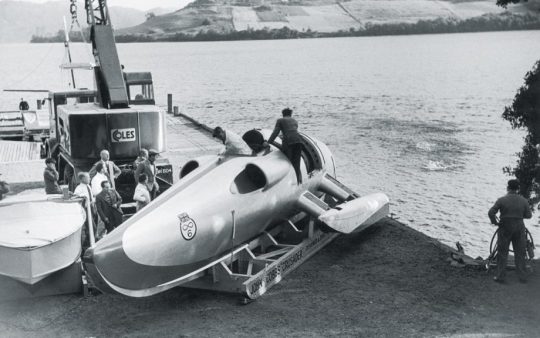



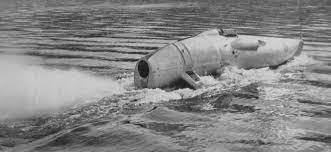



On September 29th 1952 tragedy struck when John Cobb made an attempt at the world water-speed record on Loch Ness which ended in tragedy as the boat crashed and Cobb was killed.
Everyone knows the story of Donald Campbell’s tragic crash on Coniston Water, England but few remember another attempt 15 years earlier. I think we all got told about Campbell in school, but John Cobb wasn’t a name I was familiar with until ten or so years ago.
For weeks, Cobb and his team of engineers were present at Temple Pier in Drumnadrochit preparing for the historic attempt during which time he endeared himself to the community by his willingness to speak to visitors, especially children, by numerous small acts of kindness and by his deference to the local respect for the Sabbath.
John Cobb was wealthy, businessman and thus able to indulge his love of speed, Cobb, who had been educated at Eton and Cambridge, had become the first man to travel at more than 400mph, a feat he had achieved on one of his runs on the salt-flats of Utah in 1947. To the press he became known as “the fastest man alive”. He was also an expert pilot, having served with the RAF for two years during the war before transferring to Air Transport Auxiliary, where he spent two more years, ferrying aircraft from factory to squadron.
Cobb had long been a well-known figure on Brooklands Motor Course, a few miles from his home in Esher, Surrey. He set lap records there with a succession of powerful, innovative cars, before turning his attention to high-speed boats.
The then world water speed record was held by an American, Stanley Sayres, with a speed of 178.4 mph. In late August 1952, Cobb, aged 52, came to Loch Ness to try to reclaim the record for Britain. As the Glasgow Herald noted, “he had made record-breaking his hobby and spent a considerable sum of money on it … The upholding of British prestige was behind his record-breaking achievements”.
Cobb’s craft was the Crusader, a silver-and-scarlet, jet-propelled speed boat, powered by the de Havilland Ghost jet engine, as deployed in the Comet airline.
It had arrived in Drumnadrochit after a 580-mile road journey from New Malden, Surrey. Constructed of plywood and high-quality aluminium made in Falkirk, by British Aluminium Ltd, the Crusader was flanked by sponsons, or floats, and had been built by Vospers Ltd in seven months.
“Provided the wind keeps down”, Cobb said at the launch, “Loch Ness should be perfect for a speed attempt. I shall go as fast as I can, compatible with safety”. He added that it might take some weeks before he was ready for the assault on the record; trials would need to be carried out on the loch for both the behaviour of the boat and for speed. Because of bad weather, he had been restricted to floatation tests at Portsmouth.
On August 26th, accompanied by his wife, his manager, Captain George Eyston, and other officials, Cobb ventured out on a fishing boat from Temple Pier to survey Loch Ness, but returned after just 15 minutes because of the roughness of the weather. Conditions were little better the following day.
A caravan supplied by a Falkirk company arrived at Drumnadrochit, for the Cobbs to use as their day-time loch-side headquarters. As technicians worked on the Crusader at the pier they were watched by intrigued locals and holidaymakers.
In early September, Cobb did test runs of 100mph and 140mph, but he needed the weather to improve considerably. “It is quite bumpy in an ordinary speedboat on the part of the loch where I have been carrying out my trials at present”, he said on the ninth. Two days later he said that Crusader would need modifications to enable it to get onto its sponsons.
The latest trial had seen the loch being too smooth for the boat. On one run Cobb could only get going with difficulty – and even then, the Evening Times reported, “only after an artificial ripple had been created in front of Crusader by a speed-boat”.
Watched by thousands of sightseers,Cobb made his first official attempt on Friday the 19th but strong crosswinds foiled him, even if he did reach an average speed on his two runs of 173 mph – 5 mph shy of the record. “No, I don’t think I did it”, he said, forestalling press questions as to whether he broke the record. His press officer said a further run would be made when conditions allowed.
The days came and went until finally, on Monday, September 29, Cobb made his second official attempt. Before leaving Temple Pier he observed that conditions were “well-nigh perfect”. As before, his attempt would be watched by thousands of people on the shore.
No-one could know what lay ahead.
Cobb’s final moments are captured in a British Pathe newsreel. The Crusader ploughs through the waters of Loch Ness. But then, two minutes and five seconds into the footage, the boat suddenly disintegrates in a flurry of foam and wreckage.
“Just before reaching the second timekeeper’s hut at the end of the measured mile, “ the Glasgow Herald recorded, “the boat developed an alarming bounce, which became rapidly more pronounced.
“In a flash it seemed to somersault and in a cloud of smoke and spray it disappeared below the surface of the loch, which at that point is almost 700ft deep. All that remained on the surface were small pieces of debris”.
Cobb’s wife, the Evening Times added, “was rushed from her spot on the measured mile to the pier and the news of her husband’s death was broken to her by a friend. She broke down and was driven back to the Drumnadrochit Hotel”. She was ushered by staff into a sitting-room.
A small boat lowered from the yacht Maureen, on which the official observer had been standing, set off to retrieve Cobb’s body. Other boats also joined in. As his body came to the surface his Mae West lifesaving equipment was quickly detected. Mrs Cobb was taken back to Inverness and in the afternoon, accompanied by friends, left by car for London.
It seemed certain that had Cobb been able to make the two runs he would have regained the water speed record for Britain. The official observer, Lt-Commander Arthur Bray, of the International Marine Timekeepers’ Association, and vice-president of the Marine Motoring Association, said the Crusader’s speed over the measured mile had been 206.8mph – more than 28mph in excess of the record.
“We have lost”, Bray added, “a very gallant Briton who has proved that as a nation we can go out and do things. What he did was to be the first man to travel on water at over 200 miles per hour”.
Peter Du Cane, managing director of Vospers Ltd, was standing beside Mrs Cobb when the tragedy happened. “He was a very great sportsman,” a shaken du Cane told reporters. “He must have been travelling at 240mph to average 206.8 mph on the measured mile”.
Rescue boats retrieved some of the wreckage, but members of Cobb’s staff refrained from advancing any theory about the accident. Rogue waves were blamed by others; Du Cane was quoted as saying: “He hit three big waves – that was his trouble”.
The hotel manager, Mr G. Nicholson, said: “We don’t know what happened. One minute the Crusader was there, the next minute it was not. There were just a few pieces floating about. I don’t remember hearing anything when it all happened. There was just the spray and then a lot of pieces”. Another eyewitness, a woman from the nearby village of Lewiston, said: “It was all over in a matter of seconds”.
Gar Wood, the US speedboat expert, said that he had experimented with a jet-powered speedboat but had abandoned the idea because of the risks. “With a propeller-engined boat, if you leave the water, everything stops”, he said. “When we tried with an aircraft jet engine, the power was so great that if the boat left the water it kept right on up”.
A post-mortem on the Tuesday determined that death had been instantaneous. Cdr Bray told the Glasgow Herald that any suggestion that waves might have caused the accident could be discounted.
“I followed the Crusader down the measured mile through binoculars and saw it start to porpoise”, he said. “There were no waves, though there was a ripple …. Whatever cost Mr Cobb his life had nothing to do with Loch Ness”.
Cdr Bray said that he and other experts would watch newsreel footage of Cobb’s final moments in slow-motion to try to discover what had happened.
Slow-motion footage had been shown the previous night on the BBC’s TV Newsreel programme. “Contrary to most reports of the accident”, noted a Herald writer, who watched the programme, “the Crusader did not appear to porpoise before breaking up or to disintegrate without cause.
“It seemed that the nose of the craft dipped, for some reason not apparent from the film. The surface of Loch Ness appeared on the film to be smooth, and there was no sign of the three waves that were reported to have been responsible, but the speed of the boat, the movement of the camera and the lighting made it difficult to determine the cause of disaster”.
On the Wednesday, a brief funeral service was held in the chapel of the Royal Northern Infirmary in Inverness. Among those present were Reid Railton, the designer of the Crusader, and John MacLeod, MP for Ross and Cromarty. The minister who conducted the service praised Cobb’s “skill, daring and valour, his courtesy and humbleness of heart”.
A cortege made its way through the town’s main streets, followed by members of Cobb’s staff, headed by Captain Eyston. Many of those who lined the streets wept. A spray of carnations, sent anonymously, bore a simple inscription: “To a gallant crusader”. Cobb’s body was then borne down to his home in Esher, Surrey.
On October 7th, a meeting of the Glenurquhart Rural Community Association decided to honour Cobb’s memory by erecting a cairn that would overlook the measured mile.
It was unveiled a year after his death by Cobb’s sister, Mrs Eileen Holloway. His brother, Gerrard, was also present, as was Peter Du Cane, but Mrs Cobb was not there. Wreaths were placed on the cairn by three local men who had assisted Cobb. The service was attended by some 200 people.
On March 27th, 1953 Cobb was posthumously awarded the Queen’s Commendation for Brave Conduct – “For services”, the citation read, in attempting to break the world’s water speed record, and in research into high speed on water, in the course of which he lost his life”.
Seventy years have now passed since Cobb’s death, but he is still recalled with affection in the area around Loch Ness. In 2002, on the 50th anniversary of Cobb’s death, the secretary of the Glenurquhart Heritage Group, said: “John Cobb is well remembered here. He had time for everyone.
“There was a great deal of interest in what he was trying to do. It was a different time then. It was only seven years after the war and people had a different attitude to heroism. It was also still a time of austerity. There wasn’t much excitement around and people knew of John Cobb because of his car racing”.
Up around Loch Ness, Cobb is remembered for his humble, courteous demeanour and for his refusal to stage his trials on Loch Ness on Sundays, because of the noise and disturbance they would cause, disrupting the Sabbath.
“I met a chap, a farmer, just a few years ago, who had run out of petrol at the roadside”, Adrian Shine says.
“John Cobb passed him, stopped, and had his chauffeur go and get petrol that allowed the farmer to get going again”
Crusader still lies at the bottom of an underwater cliff, missing one sponson, upside down, and broken in two, having shattered at the cockpit area, just at the point the third alloy bulkhead should have been.
Pics include Crusader making it’s way past Inverness Castle, Cobb, the craft at Loch Ness, the funeral cortege in Inverness and the memorial cairn to the man.
10 notes
·
View notes
Text
Read this if you want to understand God and Satan

God is an all powerful and all knowing spiritual being who is Sonic the hedgehog.
If you want to study how God deals with the human race read the Bible. The old testament in bible details black history (jews are really black, not white, Judaism worships Lucifer). The new testament in bible talks about the teachings of Jesus Christ who is the son of God and what Jesus wants his followers (who he calls his brothers and sisters) to know and abide in his teachings.
This is all true. The world is ran by devil worshipping luciferians who dominate the Human population. If there are truly 8 billion people in the world, then there are 1 billion humans (who descended from Adam and Eve) and there are 7 billion non-human luciferians (who don't obey God, they obey the devil).
These luciferians pretend to be Christian and worship Jesus Christ but in reality they obey demons and the devil.
God of the universe who created the holy Bible, controls both the good and the evil.
I form the light, and create darkness: I make peace, and create evil: I the LORD do all these things.
Isaiah 45:7 KJV
For example God made 9/11 happen and made two commercial airplanes knock down both twin towers, why did God do this.
God let the devil (Remember God controls good and evil, so therefore God controls the devil). God let the devil knock down both twin towers in New York with bombs and two airliners and he also bombed building seven.
Why did God let something as tragic as 9/11 happen. Because the people inside the twin towers were non-human luciferians. God wouldn't have let 9/11 happen if they were all real human beings created by God.
The Devil knows the bible better than of you luciferians (you are a luciferian if you are reading this post) since the devil knows the scriptures he knows everything I'm saying in this post and the Devil is a master deceiver and master liar.
If you have friends and family for example. Your friend and family can worship the devil and you will have no idea they worship the devil. Satan gets all of his powers from lying and deception.
Black Americans who were enslaved from 1600 all the way to 1850s are God's chosen people we are the true jews of Israel.
The white people you see in the country Israel they worship lucifer, read the Babylonian Talmud and you will discover they worship and glorify Lucifer. Also in the Talmud it says Jesus Christ was a bastard son of a Roman soldier and that mother Mary was a whore (Mary was a holy virgin mother of Jesus).
Remember most Christians are luciferians that worship the devil, they will never tell you the truth. It is impossible for someone to tell you the truth that they worship the devil. Non-human luciferians are all deceivers and liars, my own best friend that I knew for 7 years was a luciferian But I didn't know until God told me in August 2019 in a dream he worships the devil.
Ask God if someone close to you is a luciferian and he will tell you a In a dream in a indirect way. When God speaks to you in a dream he speaks to you in a dark parable or a dark speech. God makes his dreams like a puzzle you have to decipher with God's wisdom.
And the LORD answered me, and said, Write the vision, and make it plain upon tables, that he may run that readeth it. For the vision is yet for an appointed time, but at the end it shall speak, and not lie: though it tarry, wait for it; because it will surely come, it will not tarry.
Habakkuk 2:2-3 KJV
When God gives you a vision (a dream)
You have to wait for something to happen in real life and wait until a appointed time and then the dream will make sense.
Sometimes you have to wait 5 years for a vision you got 5 years ago to make sense.
Only God can give you dreams, if you get nightmares (I've had plenty of nightmares) then God is trying to warn you of something, or God is trying to show how dark and evil something in your own personal life is.
0 notes
Photo










Shakespeare Appreciation Week Day Two: Favourite Play(s): Richard II
Images (from top and then left to right by row): Title of 1608 Quarto, the first appearance in print of the deposition scene; Derek Jacobi (BBC, 1978); Fiona Shaw (National Theatre/BBC, 1995/1997); Mark Rylance (Shakespeare’s Globe, 2003); Ben Whishaw (BBC, 2012); David Tennant (RSC, 2013/2016); Charles Edwards (Shakespeare’s Globe, 2015); Christopher Liam Moore with Jeremy Peter Johnson as Aumerle (Oregon Shakespeare Festival, 2016); Sarah Fallon (American Shakespeare Center, 2018); Simon Russell Beale (Almeida, 2018)
(All images come from productions I’ve seen, either live or filmed, although they don’t represent every production I’ve seen -- I can think of at least five I’ve seen that aren’t included, mostly because I don’t have quality color pictures of them or in at least one case any pictures of the production, and tumblr only gives you so much space.)
***
There was, of course, no question which play I’d choose for today’s focus. I first read Richard II 20 years ago as an undergraduate; it had been on my radar for a few years before that, largely because of Fiona Shaw’s performance in the title role at the National Theatre, which at the time was pretty controversial -- although my very first encounter with it was this United Airlines commercial, which stuck with me for years afterward although I was quite small when I saw it. I had an idea when I first read it that Richard was seen as something of a romantic hero who gains wisdom through suffering and was a bad king because he was really a poet, and then when I first read the play I was very confused because that wasn’t how I saw it at all. I found it really interesting intellectually but it didn’t grab me emotionally, and I also found that this made it perfect fodder for the undergraduate thesis I had to write the following year and by the time I was finished with that I was basically the gibbering wreck you see today.
Some years back I wrote a couple of posts about why it is my favorite play for a “30 Days of Shakespeare” meme on my old livejournal, so I thought I would reproduce them here since I stand by most of what I said in them. (I will put it under a readmore because it got long.)
Day #1: Your favorite play
Probably anyone who has a) read the play and b) looked at my lj for about a second or c) ever talked to me for more than about five minutes knows that it is Richard II.
In the interests of making this post mildly interesting, perhaps, I suppose I had better talk a little bit about why! Occasionally I get asked this question by people I don't know very well, because it is kind of a weird play to have as one's favorite, and I have learned to say that it's because the language is so beautiful and the politics are so fascinating and complex, which is all absolutely true, but I say it because when I have tried to explain that I identify with Richard's self-destructive tendencies and absolute inability to shut up and the fact that he ends up completely alone in his own head, people look at me like I am crazy (and probably like I am reading the play on a sort of high-school level, like when they teach Romeo and Juliet because it's about teenagers so they assume The Kids Can Relate). Not that they are exactly wrong, at least about the crazy (I wrote a dissertation in which the play is central, so I think I can safely claim to be reading it above a high-school level).
Anyway, the other thing that I have probably explained many times, but is probably illustrative of my approach to things, is that what really hooked me on the play in the first place was that it was really quite puzzling and not at all what I expected. What I knew about it going in was that it was about a Tragic Poet-King who Gains Wisdom Through Suffering -- the Romantic reading, basically -- which I thought sounded like the sort of thing that would appeal to 20-year-old me, and then I actually read the play and did not get that at all, and did not really have much of an emotional reaction. Naturally this meant it was perfectly suitable as a topic for the BA thesis I was going to have to write the following year, as it was both puzzling and completely ruinable, since I didn't think I would be sad if I came out of the thesis hating it.
That was ten years ago and recently a well-known scholar asked me why I haven't buried Richard II yet. But no, I am not Henry the Fifth, nor was meant to be.
Day #2: Your favorite character
Yesterday's post, I trust, makes my answer to this question fairly obvious, doesn't it? I suppose it doesn't have to, since there are texts I like in which I don't like any of the characters, and Richard II is one of those plays where nobody who has a significant amount to say is tremendously admirable, but I dunno, I love them anyway, except for Northumberland, who is awful, and anyway, you guys know me by now, you obviously have guessed I'm going to talk about my dead bisexual Plantagenet boyfriend.
Yesterday I said that "when I have tried to explain that I identify with Richard's self-destructive tendencies and absolute inability to shut up and the fact that he ends up completely alone in his own head, people look at me like I am crazy," and in many ways they are right to do so, because, I mean, those are the things I identify with about Richard -- he always does exactly the wrong thing for the situation, and it is genuinely impossible to shut him up without killing him (and the things he says are invariably gorgeous, which I love but do not really identify with exactly, because I just babble).
And then, too -- I always get twitchy about trying to universalize Shakespeare especially when he is talking about kingship/succession/politics, and obviously he is and you can't separate that from what happens in the play, but we all do it anyway in our own heads. And Richard II is so much about wrestling with the idea that after all you're really not special, so I guess -- since this is something I worry about way too often -- there is something cathartic about it? I don't know. I felt very inhibited writing this post, because my great squishy love for Richard II is intimately connected to ALL MY RAMPANT INSECURITIES even as I talk about identifying with someone who thinks not all the water in the rough rude sea can wash his bum. ;)
(And besides it turns out he kind of is special, because, I mean, listen to him! I have arguments with people all the time about how we are not supposed to take his super-shiny awesome poetry as necessarily him being a super-shiny awesome poet, it's just the way the play is, which, yes, but then we get to the Pomfret speech and I go over all wibbly. That's the one I kept reciting to myself during my first real depressive episode, and it made me cry a lot but it also helped a bit.)
...you know, I was going to talk about how he is also canonically snarky and pretty and bisexual and I am surprised he doesn't get more love in the tiny Shakespeare fandom such-as-it-is, but he does now, in the corner of it I frequent, and anyway I had an opportunity for mopey navel-gazing, so I did that instead.
These posts are themselves now ten years old (almost exactly) and I don’t think I have changed that much, although I have slid far deeper into an indifferent middle age than when I wrote them, and now all the stuff about the pain of discovering you’re not special is much keener. These days you see a lot of talk about how this is A Play For Our Times that centers around the idea that Donald Trump is basically Richard II because he doesn’t have the dignity to be Lear and it always makes me want to hide in a hole (I don’t think Trump has the dignity to be any Shakespeare character). But it probably takes a certain kind of person to identify with Richard II, especially if you’re not even gay, so perhaps I should hide in a hole anyway.
(also: I totally need to listen to the Public Theater production, but I’m dithering over whether to wait until it’s all done and listen to it all at once! It sounds amazing though)
#richard ii#theplaysthething2020#30-year-old me was a lot more articulate than 40-year-old me#now i'm just like WHARGARBL#i also need to watch the sam wanamaker one#there has been SO MUCH free shakespeare this year and i have missed almost all of it because my attention span has been wrecked
42 notes
·
View notes
Text
Flashback: Unabomber Publishes His ‘Manifesto’
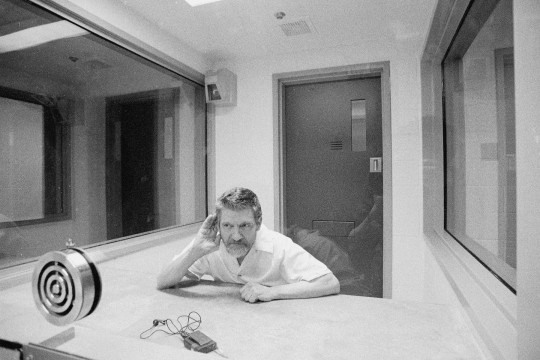
Ted Kaczynski was a madman who killed and maimed innocent people – but did some of his worries for the future come true?
By 2017 standards, a bearded man ranting in his manifesto about how “one of the most widespread manifestations of the craziness of our world is leftism” might, at best, have a chance ending up name-checked by Alex Jones. Most likely, he’d become the hero of a thousand faceless message board posters. His 35,000-word diatribe against technology titled “Industrial Society and Its Future” might be suitable for a personal blog, but a national newspaper? Surely not.
Of course, more than 20 years ago, when Ted Kaczynski mailed out what would come to be known as the “Unabomber Manifesto,” it was huge news. After over a decade spent living as a recluse without electricity or running water in a cabin in Montana – sending mail bombs to university academics and corporate airline executives – Kaczynski sent letters to the New York Times and the Washington Post demanding they publish his manifesto and agree to print an annual follow-up for three years. If they did, the bombings would cease. If not, the Unabomber hinted at more bombings to come.
It had started in May of 1978, when a package exploded and injured a Northwestern University security officer. A year later, another bomb was sent to the same college, injuring a graduate student. Also in 1979, Kaczynski snuck a bomb into the cargo hold of an American Airlines flight. It went off mid-flight, causing an emergency landing and afflicting 12 passengers with smoke inhalation. In 1985, he switched things up, and sent a shrapnel-loaded bomb to a computer store in Sacramento, California, claiming the owner as his first victim. By the mid-1980s, the Unabomber had become a real-life American boogeyman. A killer who would strike without warning, and without much reason. Why was he doing what he did – and when would he do it again?
The publication of the manifesto would end up being his undoing. Members of Kaczynski’s family had a slight suspicion Ted could be the person behind the terror campaign. His brother David was one of the thousands of people who called the FBI tip-line after the manifesto was published and a million-dollar reward was offered for information leading to the capture of the Unabomber. After a long search, FBI agents arrested an unkempt Kaczynski in his Lincoln, Montana cabin on April 3rd, 1996. They found bomb making components, over 40,000 journal pages and the manifesto’s original typed manuscript.
There’s no defending the actions of a person who mails bombs with the intent to do serious harm. But Andrew Sodroski, executive producer of the new Discovery mini-series, Manhunt: Unabomber, thinks there is plenty to take away from Kaczynski’s words. As he said in a phone conference with reporters leading up to the show, “What the manifesto has to say about our relationship with technology and with society is more true right now than it was when Ted published it.”
Not many domestic terrorists convicted of murder get called prophetic by television producers – and there are scholars from different sides of the political spectrum who agree that the the Unabomber’s anti-technology stance was ahead of its time. “His work, despite his deeds,” wrote Dr. Keith Ablow, a psychiatrist and member of the Fox News Medical A-Team, “deserves a place alongside Brave New World, by Aldous Huxley, and 1984, by George Orwell.” Ray Kurzweil, noted author, computer scientist and futurist, quoted a passage from the manifesto in his 1999 book, The Age of Spiritual Machines. Some believe he’s a murderous modern-day Henry David Thoreau, while others say he’s a genius and a prophet. So what, exactly did he get right?
Kaczynski opens his manifesto with, “The Industrial Revolution and its consequences have been a disaster for the human race.” The technology he goes on to rail against, keep in mind, was mid-1990s – before smartphones, before Twitter, before “Likes” on Facebook and algorithms helped pick out things for you to buy and experience. Although the word “dystopia” never shows up throughout the essay, Kaczynski believed (and you have to assume still does so from his prison cell) that the future wasn’t some Philip K. Dick or Handmaid’s Tale scenario; the dystopian future started happening a long time ago. Computer networks, the mass-communication media, the modern health care system, pesticides and chemicals, all products of the Industrial Revolution, are destroying the planet, he writes. As one portion of the manifesto is sub-titled, “The ‘Bad’ Parts of Technology Cannot be Separated From the ‘Good’ Parts.”
In point number 49 the manifesto, Kaczynski writes, “In the modern world it is human society that dominates nature rather than the other way around, and modern society changes very rapidly owing to technological change.” One of the big problems, he believed while writing his manifesto, was the inevitable growth of artificial intelligence and how humanity will cope with it. “First let us postulate that the computer scientists succeed in developing intelligent machines that can do all things better than human beings can do them.” As one Wired article explained in 2015, “A manufacturing device from Universal Robots doesn’t just solder, paint, screw, glue, and grasp – it builds new parts for itself on the fly when they wear out or bust.” From checking you out at the grocery store to flipping burgers, robots are being designed to integrate into the labor force and cut costs.
He goes on to write in point number 172, “In that case presumably all work will be done by vast, highly organized systems of machines and no human effort will be necessary. Either of two cases might occur. The machines might be permitted to make all of their own decisions without human oversight, or else human control over the machines might be retained.” When Kaczynski’s thoughts were published, we were still dealing with the Terminator version of the robots overtaking humanity and destroying it – it was a nightmare scenario, fiction. But Kaczynski wasn’t writing speculative fiction; he was stating, from an academically-trained point of view, where he saw technology headed.

Technology overtaking humanity was only one of the scary possibilities. The rise of the “one percent” super rich and corporations controlling everything, was another. “Human freedom mostly will have vanished, because individuals and small groups will be impotent vis-a-vis large organizations armed with supertechnology and an arsenal of advanced psychological and biological tools for manipulating human beings, besides instruments of surveillance and physical coercion,” he wrote.
Tech companies have untold amounts of data on every person that logs online for everything from shopping for cat litter to ranting on Twitter. How to understand that data – and what to use it for – is an industry in itself. Could it be used to manipulate us? See the 2016 U.S. election and the rise of fake news spread through Facebook. “Hyperpartisan Facebook Pages Are Publishing False And Misleading Information At An Alarming Rate,” as one 2016 BuzzFeed article put it, showed up in feeds even if the people didn’t follow those groups. Some of the false news was spread the old-fashioned way, through word of mouth; but, as John Herman of the New York Times explained, misinformation on the social media service thrives or dies, “at least in part, on Facebook’s algorithm.” As Kaczynski believes, that’s just the tip of the iceberg. All of this seemed farfetched when Kaczynski’s words were put in front of a mass audience. In 1994, audiences were being told suave cyberterrorists like the ones in the movie The Net were the ones looking to steal your information online and do whatever they please with it.
After all this, however, calling Kaczynski a prophet might be a stretch. He’s a highly intelligent person who wanted to try and stop where he saw humanity headed by any means necessary – including murdering people. Yet he routinely points out throughout his manifesto that there very well might be no stopping the inevitable. The entire point of his manifesto, as he states, is revolution, anarchy: “Its object will be to overthrow not governments but the economic and technological basis of the present society.” Kaczynski, who has stated admiration for the eco-anarchist movement (“but I think they could do it better,” he also said in an interview in 1999), takes aim at both leftists, including “socialists, collectivists, ‘politically correct’ types, feminists, gay and disability activists, animal rights activists and the like”). He also writes, “conservatives are fools,” and that they’re, “just taking the average man for a sucker, exploiting his resentment of Big Government to promote the power of Big Business.” Kaczynski even engages in some gaslighting: “Feminists are desperately anxious to prove that women are as strong and as capable as men. Clearly they are nagged by a fear that women may NOT be as strong and as capable as men.”
All of this reiterates the point that Kaczynski is no hero whatsoever. The person who wrote “Industrial Society and Its Future,” is a fanatic. And as is sometimes the case, fanatics can take things to the tragic extreme. Yet there is something to be taken away from his words if you read closely; it’s that we give up a piece of ourselves whenever we adjust to conform to society’s standards. That, and we’re too plugged in. We’re letting technology take over our lives, willingly. It’s the sort of thing that doesn’t take a madman dressed up like a prophet to tell us; it’s all too evident. Kaczynski, to steal a phrase from the tech world, was just an early adopter of these thoughts. Yet his warning will probably forever go unnoticed because of the horrific deeds he carried out to get his message across.
https://www.rollingstone.com/culture/culture-news/flashback-unabomber-publishes-his-manifesto-125449/amp/?__twitter_impression=true
2 notes
·
View notes
Text
Headlines
1 killed in shooting in Seattle’s protest zone
(AP) A 16-year-old boy was killed and a younger teenager was wounded early Monday in Seattle’s “occupied” protest zone--the second deadly shooting in the area that local officials have vowed to change after business complaints and criticism from President Donald Trump. The violence that came just over a week after another shooting in the zone left one person dead and another wounded was “dangerous and unacceptable” police Chief Carmen Best said. Demonstrators have occupied several blocks around the Seattle Police Department’s East Precinct and a park for about two weeks after police abandoned the precinct following standoffs and clashes with protesters calling for racial justice and an end to police brutality. Best said the shootings are obscuring the message of racial justice that protesters say they are promoting. “Two African American men are dead, at a place where they claim to be working for Black Lives Matter. But they’re gone, they’re dead now,” the police chief said.
Two Friends in Texas Were Tested for Coronavirus. One Bill Was $199. The Other? $6,408.
(NYT) Before a camping and kayaking trip along the Texas Coast, Pam LeBlanc and Jimmy Harvey decided to get coronavirus tests. Both tests came back negative. Then their bills came. And that’s where the similarities stopped. The emergency room charged Mr. Harvey $199 in cash. Ms. LeBlanc, who paid with insurance, was charged $6,408. Ms. LeBlanc’s health insurer negotiated the total bill down to $1,128. The plan said she was responsible for $928 of that. During the pandemic, there has been wide variation between what providers bill for the same basic diagnostic test, with some charging $27, others $2,315. It turns out there is also significant variation in how much a test can cost two patients at the same location.
Three Words. 70 Cases. The Tragic History of ‘I Can’t Breathe.’
(NYT) “I can’t breathe,” George Floyd pleaded in May, appealing to the Minneapolis police officer who responded to reports of a phony $20 bill and planted a knee in the back of his neck until his life had slipped away. Mr. Floyd’s dying words have prompted a national outcry over law enforcement’s deadly toll on African-American people, and they have united much of the country in a sense of outrage that a police officer would not heed a man’s appeal for something as basic as air. But dozens of other incidents with a remarkable common denominator have gone widely unacknowledged. Over the past decade, The New York Times found, at least 70 people have died in law enforcement custody after saying the same words--“I can’t breathe.” The dead ranged in age from 19 to 65. The majority of them had been stopped or held over nonviolent infractions, 911 calls about suspicious behavior, or concerns about their mental health. More than half were black. Many of the cases suggest a widespread belief that persists in departments across the country that a person being detained who says “I can’t breathe” is lying or exaggerating, even if multiple officers are using pressure to restrain the person.
Mexican president to fly commercial to the US
(Washington Post) When Mexico’s president travels to the White House next week, he’ll have to reckon with the same questions travelers everywhere are asking. How early do you need to arrive at an airport these days? Will the middle seat be left empty? During the layover, will the food court be open? Next week, Andrés Manuel López Obrador will be the rare foreign head of state to fly commercial to meet the U.S. president. The populist leader promised to sell Mexico’s presidential jet when he began his term in 2018--part of a larger effort to throw off the luxe trappings of the country’s highest office. He has also opened the presidential palace to the public, and is ferried around the capital in his own Volkswagen Jetta. While the jet is still unsold, López Obrador has stood by his pledge to fly only on commercial airlines.
This is the moment to address decades-old problems, UK PM Johnson says
(Reuters) Prime Minister Boris Johnson said on Tuesday that Britain must seize the moment in the wake of the COVID-19 pandemic to fix decades-old problems and narrow the productivity gap with its competitors. “We must work fast because we’ve already seen the vertiginous drop in GDP, we are waiting as if between the flash of lightning and the thunderclap,” he said. “We must use this moment now, this interval to plan our response and to fix of course the problems that were most brutally illuminated in that COVID lightning flash: the problems in our social cares system, the parts of government that seemed to respond so sluggishly.” He said Britain was not as productive as many of its competitors, and while London was the “capital of the world”, much of the country felt left behind and “unloved”.
EU reopens its borders to 14 nations but not to US tourists
(AP) The European Union announced Tuesday that it will reopen its borders to travelers from 14 countries, and possibly China soon, but most Americans have been refused entry for at least another two weeks due to soaring coronavirus infections in the U.S. Travelers from other big countries like Russia, Brazil and India will also miss out. Citizens from the following countries will be allowed into the EU’s 27 members and four other nations in Europe’s visa-free Schengen travel zone: Algeria, Australia, Canada, Georgia, Japan, Montenegro, Morocco, New Zealand, Rwanda, Serbia, South Korea, Thailand, Tunisia and Uruguay.
Europe sours on global powers
(Foreign Policy) A new poll from the European Council of Foreign Relations shows the extent of the damage the coronavirus pandemic has wrought on attitudes toward the United States. The decline was most dramatic in Germany, Denmark, and Portugal where at least 65 percent of respondents said that their view of the United States had worsened during the pandemic. It’s not just bad news for U.S.-Europe relations; Russia and China also suffered reputational damage, according to the poll.
China passes sweeping HK security law, heralding authoritarian era
(Reuters) Beijing on Tuesday unveiled new national security laws for Hong Kong that will punish crimes of secession, subversion, terrorism and collusion with foreign forces with up to life in prison, heralding a more authoritarian era for China’s freest city. China’s parliament passed the detailed legislation earlier on Tuesday, giving Beijing sweeping powers and setting the stage for radical changes to the global financial hub’s way of life. “The punitive elements of the law are stupefying,” Simon Young, a law professor at the University of Hong Kong’s law school and a barrister, told Reuters. Britain and some two dozen Western countries urged China to reconsider the law, saying Beijing must preserve the right to assembly and free press. Washington, already in dispute with China over trade, the South China Sea and the coronavirus, began eliminating Hong Kong’s special status under U.S. law on Monday, halting defence exports and restricting technology access. China, which has rejected criticism of the law by Britain, the European Union, Japan, Taiwan and others, said it would retaliate.
Christian television station in Israel loses license
(Foreign Policy) Israeli regulators have revoked the broadcasting license of an evangelical Christian television station for misrepresenting its mission. Ward Simpson, the CEO of God TV and the station’s owner, had attracted the scrutiny of regulators after appearing in a fundraising video after the license was granted saying “God has supernaturally opened the door for us to take the gospel of Jesus into the homes and lives and hearts of his Jewish people.” He later clarified that he was not trying to convert Jews; he was simply seeking to get them to accept Jesus as their messiah. Regulators said God TV is welcome to reapply for a license if it vows to describe the nature of its broadcasts more honestly.
Syria faces mass starvation or mass exodus without more aid, WFP says
(BBC) Syria faces the risk of mass starvation or another mass exodus unless more aid money is made available, the head of the UN World Food Programme has said. Ahead of a donor conference in Brussels on Tuesday, David Beasley told the BBC a million Syrians were severely food insecure and some were already dying. More than 380,000 people have been killed and 13.2 million others—half the pre-war population—have been displaced inside and outside Syria since an uprising against President Bashar al-Assad began in 2011. "The whole world's facing crisis unlike anything we've seen probably in everyone's lifetime. But, quite frankly, what's happening in Syria is unprecedented. It's the worst of all storms coming together," Mr Beasley said in an interview. "If we don't have the money, here's the bottom line: you're going to either have mass migration, [or] starvation, and exploitation by extremist groups," he warned. "I think the people will leave, just like they did five or six years ago."
Coronavirus Is Battering Africa’s Growing Middle Class
(NYT) James Gichina started out 15 years ago as a driver shuttling travelers from the airport, worked his way up to safari guide, and with the help of some bank loans, bought two minivans of his own to ferry vacationers around. But when the coronavirus pandemic cratered the tourist industry and the economy, Mr. Gichina removed the seats from his minibus and started using it to hawk eggs and vegetables. With what he now earns, he said, he can barely afford to pay rent, buy food or send his 9-year-old son to school. “We have been working hard to build better lives,” Mr. Gichina, 35, said of his colleagues in the tourist sector. Now, he said, “We have nothing.” As the coronavirus surges in many countries in Africa, it is threatening to push as many as 58 million people in the region into extreme poverty, experts at the World Bank say. But beyond the devastating consequences for the continent’s most vulnerable people, the pandemic is also whittling away at one of Africa’s signature achievements: the growth of its middle class. About 170 million out of Africa’s 1.3 billion people are now classified as middle class. But about eight million of them could be thrust into poverty because of the coronavirus and its economic fallout, according to World Data Lab, a research organization.
1 note
·
View note
Text
Top 10 Favourite Movies I Have Seen (So Far)
How to Make an American Quilt (1994)

I’m not sure exactly why, but I have always had a thing for intergenerational movies that go back and forth in time, which I think that this movie does superbly. You get to know each of the character’s backstories, and it is also a coming-of-age film where the main protagonist must choose a path and be happy with the one she goes down. This was a film I would watch again and again as a teenager when I was sad (movie marathons were always the cure for my blues back then). More recently, there are other reasons why this movie appeals to me; I can relate to Finn’s thesis-writing (I know it’s frustrating and easy to distract yourself from), and I can also relate with her dilemma in choosing what kind of future she will have. Also, Winona Ryder can do no wrong. Winona forever.
The Joy Luck Club (1993)

Another intergenerational film, I think it does a great job of juxtaposing the difference between parents who immigrate to another country and their children who do not really understand the sacrifices they have made to actually get there, which can cause rifts and divides. It does this specifically with the Chinese culture in mind, which is fascinating in its own right, and quite different to the US, which is where they immigrate to. The daughters who try to understand their mothers are able to bridge the divide when they are able to empathise with where their parents are coming from, by the parents telling them tales of their origins. My favourite character is hands-down Ying-Ying St. Clair, whose backstory is definitely the most tragic. In China, Ying-Ying was happily married to Lin-Xiao (Russell Wong) with a baby boy in China until Lin-Xiao abuses her and abandons her for an opera singer. Overwhelmed by her depression, Ying-Ying begins to dissociate and accidentally drowns their baby son in the bathtub during one of these episodes, which haunts her ever afterwards. Years later, she has emigrated to America and suffers from trauma of her past, worrying her new family, including her daughter Lena. When she is able to get Lena find her voice and to leave her own abusive husband, Harold. I have nothing but love for this film, which breathes life into Amy Tan’s equally beautiful novel. This film adaptation does the novel proud; It’s well-acted, well-told, and simply just heart-warming.
Sinister (2008)

I love myself a good horror movie, and Sinister flips the script by starting out as a crime mystery before going bananas and introducing Mr. Boogie (or Bughuul), a pagan demon who manipulates the lives of children, having them kill their families, until he can consume the child's soul. Ethan Hawke, who both directs and stars in this film, does a phenomenal acting job as washed-up crime author Ellison Oswalt, who moves his family into one of the homes which was the scene of one of the ‘crimes’, where a whole family has been massacred and one child is missing. It isn’t long until he finds a bunch of 8mm tapes in the attic, which represent the equivalent of snuff films, detailing previous family massacres occurring elsewhere. Seriously, some of these 8mm tapes are both difficult but strangely thrilling to watch, due to their haunting quality. It takes him a while before he becomes aware of Bughuul, who he discovers hiding in the corner of one of the tapes, and who he is able to get to know about with the help of a rookie cop and a professor. The ending is also a delicious twist, and indicates the inevitability of not being able to escape evil. Seriously, it’s a must-watch, as it breathes rare new life into the tired horror genre.
Insidious, Chapter One (2010)
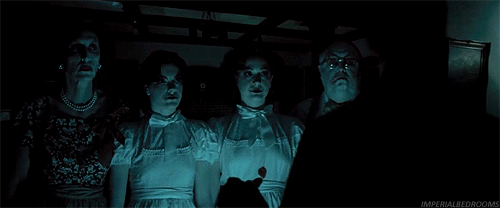
Another worthy 21st century horror addition, the Insidious franchise (especially the first film) delivers some great twists, and creates a rich universe way beyond any ordinary haunted house or child-plagued-by-demon trope, by introducing some genuinely scary characters (The Lipstick Demon, Doll Girl, and the Bride in Black, anyone?!), and also introducing The Further, a dark and timeless astral world filled with tortured dead souls and nightmarish spirits. I love the twist that the end of this movie delivers, and also the appropriate jump-scares throughout. It is yet another horror movie that breathes life into a somewhat tired genre. 10/10, I highly recommend this movie, even if The Lipstick Demon looks kinda like Darth Maul, lol.
Reality Bites (1994)

Although it’s kind of aged badly, due to advancing technology, this movie was one of the first to introduce the idea of reality television, whilst also capturing the zeitgeist of Generation X, with it’s rather nihilist message about life after college, and the trials and tribulations of growing up. Some of the characters (especially Lelaina and Troy) are self-indulgent, immature, intellectually snobby and navel-gazing, but you root for Lelaina to succeed because she is played with enough sympathy by the amazing and incomparable Winona Ryder that we believe she deserves better. This is one of the reasons I hate that she ends up with Troy, even if he is the broody bad boy we are all expected to swoon over. Seriously, he treats Lelaina so badly that I just want to punch him in the face. It also has some great side characters, like Vicky, who works at The Gap, but is scared to find a real job, and Sammy, who is gay and afraid that he may have HIV. It is also relatable for me as a Millenial who graduated from university when the Global Financial Crisis (GFC) hit, making it complicated to find a good job, mirroring the recession that these characters graduated into. I love that it talks about pivotal Generation X issues, as well as universal issues that encompass growing up and moving into adulthood. Also, again, Winona forever.
Candyman (1992)

Candyman is a horror film that subverts horror movie expectations whilst still managing to deliver some great scares. Being set in the long-gone notorious Chicago housing projects Cabrini Green, a name synonymous with vice, violence and murder, and a place which instils non-supernatural horror in an individual all on its own, tells the story of thesis student Helen, who is researching urban legends, and through her participants, she learns the story of Candyman, a vengeful rendition of the classic Bloody Mary, who will split you from groin to gullet with his hook for a hand if you say his name five times in the mirror.
The people who recount this legend go on to recount a notorious murder that has taken place recently in Cabrini Green which has been attributed to Candyman, and Helen chooses to investigate the claim. Helen rationalises that the residents of Cabrini Green use the legend of Candy Man to cope with their stressful daily lives. Before visiting Cabrini Green, Helen and her research associate decide to test the theory by saying ‘Candy Man’ five times in a mirror, but nothing happens, at least not yet. In real life, the murder rate in Cabrini Green peaked in 1992, the same year that Candy Man was made. Candy Man himself (played with great aplomb by the legendary Tony Todd) doesn’t show up until around 44 minutes into the movie, but when he does, he steals the show with his dangerous charisma.
In total, Candy Man subverts 3 horror rules: Number one, that you need to have a high body count to keep audiences engaged. By doing so, it stretches out the tension for as long as it can. Number two, there is a Black antagonist. There were some issues addressed by Black critics that this depiction played into some racist stereotypes, such as the idea that Black people need a White saviour, that Black people are especially superstitious, and that Black men prefer to pursue White women. But one could say that Candy Man is more a depiction of the White fears associated with Black poverty, and specifically, White Liberal fears that Black poverty can’t be helped, despite their best efforts. Helen doesn’t mean any harm (some may even call her an ally), yet she dies anyway.
By making the antagonist Black, the film becomes about so much more than just visceral horror, it is about societal, racial and historical horror as well, albeit told from a White perspective. It also plays into the fear that Black people, through no fault of their own, could be killed for no reason at all but panicky neighbours. Finally, number three, this film is more sad than scary; sadness tends to be the most common negative emotion that I experience, so I am drawn to movies that have something to say about it. The only reason Candy Man gives for wanting to kill Helen is that she demystified him, which seems pretty petty and vindictive. She is also supposed to resemble his long-lost love that got him killed in the first place. When Candy Man kills the psychiatrist in the movie, it is literally the only on-screen proof we have that Candy Man isn’t just a figment of Helen’s imagination. Candy Man, like my most favourite horror film, The Shining, begs the question: Are there really supernatural elements at play here, or is the main character simply going insane? Phew, this was more than I planned to write, but I guess this film is complex enough to warrant it. See it for yourself.
Final Destination (2000)

As time wore on, the Final Destination franchise became more well-known for its gruesome deaths (and tired plot) than anything else, but the first addition was a fresh take on the inescapability of death, and the vengance Death Itself may take if you screw with his Design. The first 15 minutes of the film are truly thrilling through the main character Alex’s premonition, and the wait after the gang have been kicked off the airline for the plane to blow up without them on board. Seriously, that scene gave me aerophobia more than any Air Crash Investigation episode. What follows are some truly twisted, macabre domino-like deaths that prove that Death has a wicked, dark sense of humour. That every character in this franchise dies eventually is kind of disappointing, and definitely places Death in this franchise as possibly the most diabolical villain in all of the horror genre (move over, Jason and Michael and Freddy). The mysterious undertaker played with delightful maliciousness again by Tony Todd adds to the mystery of understanding Death’s Design. and the reality that no matter what the survivors do, Death will eventually come for them, really adds to the overall hopelessness and nihilism of the whole situation. The way that the last film of the Final Destination franchise, which is really a prequel to the first film, rounded out the franchise really well, and provided a twist as good as the original film was epic. If you are going to watch any of the films in this franchise, I cannot recommend the first and last film enough.
Now and Then (1996)

I love this film more for the cheesy, feel-good memories of my childhood it gives me. Christina Ricci is also one of my all-time favourite actresses (I absolutely loved her as Wednesday Addams), which just bolsters this movie in my eyes. Thora Birch does a good job as well. But seriously, I can pop this movie on any time and it’ll just make me instantly happy for a simpler era. Even if I wasn’t born in the 60′s or 70′s, there is a lot to relate to about bridging the gaps between childhood and the inevitable teen cross-over. I mean, who didn’t have seances in graveyards with their friends as a 12-year-old girl? No-one?! Just me then. OK. Ahem. I think my favourite character was hands-down Gabby Hoffman’s Sam, who is trying to cope with her parent’s divorce in a town and time when divorce is unheard of. I like that her grown-up character played by Demi Moore is a successful writer, and is also the narrator of the entire movie. If you want to watch a truly feel-good movie that promotes feminist ideals, this movie is for you.
IT: Chapter One (2017)

Since I watched the 1990 TV miniseries in 1992 at the tender age of 7 (my parents never monitored what I watched - which sometimes led to some gnarly nightmares), I have been waiting for a worthy remake. I, like most of the aficionados that watched the miniseries, loved Tim Curry’s rendition of the demonic entity of IT, but weren’t quite happy about the spider ending. If you’ve seen it, you know what I mean. You may be asking why I haven’t included Chapter Two that came out this year (2019), and the reason is, despite Bill Hader’s wonderful performance as the grown-up Ritchie, a cameo by Stephen King himself, and more screen-time for Bill Skarsgaard’s scary clown, the ending here was also disappointing. IT’s true form just doesn’t seem to translate well onto screen. It was adequate. Meh. Anywho.
IT Chapter One, however, is awesome. Instead of jumping back-and-forth in time like both the mini-series and the book did, it focuses on the well-acted ‘Loser’s Club’ as kids, and is truly scary like this story should be. The bully Henry Bowers is truly sociopathic, and Bill Skarsgaard as IT truly nails the fact that IT is so much more than just a killer clown. The death scene with Georgie at the beginning of the film is quite subversive and daring, as it actually shows you the death of a child in all its gory detail. My verdict? Watch the first with gusto, but do not expect anything great from Part Two. Part Two has to exist for continuity, but the first film outshines the second installment in every way possible.
Lady Bird (2017)

For an Indie sleeper film, this story is fantastic as both a coming-of-age film and a depiction of separating from your parents and becoming your own person. Ladybird’s mum is overprotective, and Ladybird needs to break free, whilst also trying not to cause a permanent rift. She’s a different kind of gal, sensitive, intelligent, artistic, and so not meant for a dead-end small town. Her transition toward independence is extremely relatable to me, as I grew up with an over-bearing, interfering mother myself. Also, it’s set in 2002, the year I graduated, with adds to my feelings of nostalgia. It’s the relatablity of Ladybird that makes it so re-watchable to me. I grew up in a dead-end town, was creative and different to my peers, and went to a fancy private school that I didn’t fit into as well. So Ladybird is a cinematic delight as you see her progress to something more hopeful in the future. A must-watch.
#must see movies#best movies#my favorite movies#movie buff#cinematic masterpieces#cinema critic#horror movies#drama movies#epic movies#saga movies#must watch#i love movies#i love film#cinema#films to see before you die#bucket list movies#top ten#must watch film#drama#horror#feel good movies#watch anytime#watch on netflix#different movies#not your average movie#think different#critiques#movies i love#movies i like#watch movies
4 notes
·
View notes
Text
Bright Light Therapy

Just now we have here in Finland the darkest weeks of the year. The sun is rising today in Turku 9.10 am and going down at 3.30 pm and in Rovaniemi there are only three and a half hours of bright time. Because of this, it is a smart idea to use at home an additional source such as a light therapy lamp. My own lamp is INNOSOL (see picture above).
You are warmly welcome to read about 400 posts about health and fitness HERE.
Light Therapy Has Healing Benefits
By Raymond Geok Seng Lee | Submitted On January 31, 2008
Shakespeare called the eyes “the window to the soul.” Increasingly, doctors are calling them a window to treating a remarkable variety of health problems with light. For years, sunlight has been a standard treatment for psoriasis, the poorly understood inflammatory condition that causes the skin thickening and eruption of red, scaly patches. But recently, light therapy has been used successfully to treat several other ailments.
1. Prolonged Menstrual Cycles
The typical menstrual cycle lasts about a month, but some women extend up to twice as long. Long cycles might be an advantage for some women – less premenstrual syndrome, for example – but for women trying to have children, long cycles limit opportunities for conception. In a pilot study, women were exposed to the light of a 100-watt light bulb while they slept. The women slept with the light on for five nights near the middle of their extended cycles, and the cycles became shorter. It does not know why this treatment works, but it is believed that light affects the regulation of female sex hormones. If so, phototherapy might one day be used to treat some cases of infertility.
2. Night-owl Insomnia
One type of insomnia involves a nightly inability to fall asleep until the wee hours – and often the abuse of alcohol and sleeping pills to bring on the sandman. It is called delayed phase syndrome (DSPS), or night-owl insomnia, and it usually develops during the teen years. Researchers blame it on having a maladjusted biological rhythm that does not say “good night” until several hours past normal bedtime. Bright-light therapy looks like the best bet for relief. In one study, 20 people with DSPS to spend two hours each morning under a bright-light appliance and then wear dark goggles for two hours before dusk. After a few weeks, participants fell asleep two hours earlier and woke up the next morning feeling more alert and refreshed. When contacted six months later. Almost all participants reported purchasing bright-light appliances.
3. Late-shift Drowsiness
There is a good reason why the work shift from midnight to 8.00A.M. is called the graveyard shift. People who work nights are two to five times more likely to fall asleep on the job and have accidents. Late-night sleepiness may impair the judgment of police, firefighters and ambulance drivers. In addition, a disturbing number of airline disasters have occurred in the wee hours. Now phototherapy may come to the rescue. 30 graveyard-shift workers were selected to perform a series of tasks every hour for one night. The workers were gauged on their sleepiness using standard tests. The next night, the lights were replaced from 500-lux lighting to 9,000-lux lights. After only one night under the bright light, the worker’s accuracy improved dramatically, while their sleepiness decreased. One night’s exposure to bright light seems to have shifted their biological clocks, enabling them to perform better on subsequent nights.
4. Nonseasonal Depression
The winter blues are just the tip of the depression iceberg. Some 10 to 15 million Americans are seriously depressed, and the condition’s most tragic consequence – suicide – claims 30,000 lives a year. The success of light therapy in treating SAD has led to studies of its effectiveness for nonseasonal depression – with promising preliminary results. In a study, 50 men were divided into two groups with severe nonseasonal depression. Half spent seven consecutive evenings in a room illuminated with 1,600 watts of bright light. The other half spent the time in a room with the lights turned low. Compared with symptoms in the dim-light group, symptoms in the bright-light group improved 18 percent.
5. Lupus
Lupus is an autoimmune disease – meaning that the immune system mistakes the body’s own tissues for germs and attacks them. It strikes many more women than men and can cause a confusing array of symptoms, including fatigue, rashes, joint pains and kidney damage. People with lupus are usually warned to avoid sunlight because it can aggravate their symptoms. One type of ultraviolet sunlight, UVA-1 helps relieve lupus symptoms. Women with lupus were exposed to a combination of UVA-1 and ordinary fluorescent light for ten minutes a day five days a week for three weeks. Nine out of ten women reported less joint pain, fatigue and other symptoms.
Raymond Lee Geok Seng is one of the foremost experts in the health and fitness industry and is a writer specializing in body health, muscle development and dieting. He has spent countless of time and efforts conducting research and share his insightful and powerful secrets to benefit men and women all over the world. He is currently the author of the latest edition of “Neck Exercises and Workouts.” Visit http://www.bodyfixes.com for more information.
Article Source: https://EzineArticles.com/expert/Raymond_Geok_Seng_Lee/119140
youtube
youtube
1 note
·
View note
Text
BROADWAY – “ALL MY SONS” – PART DUA

The stage @ American Airlines Theatre just before the performance
A. OPENER
A theatrical performance is an artistic simulation of a story. It resuscitates the story, offering it a visual and audio reality. Theatre is the pursuit of Art as a form of the deepest human expression. Perhaps David says it best :

B. RE-INTRODUCTION
This essay is a continuation of Part 1 dated July 31, 2019 which is accessible via this link :
https://thinktosee.tumblr.com/post/186676809458/broadway-all-my-sons-part-1
“All My Sons” by renowned playwright, Arthur Miller is a tragic story of the Keller Family, post WW2. The trauma of war and the ghosts it inevitably creates, haunt the family till the end of the world. The ultimate crime – war, cannot be buried or bleached-clean through wealth, respectability or heroics. War it seems, is all pervasive. Everyone a victim of its cruelty, greed and corruption. The survivors are left to adjust and to move on, from the trauma. Except, the ghosts. Justice follows upon the crime, demanding its turn, and in the Kellers’ case, it makes its entrance in the most unexpectedly tragic way.
C. THE PLAY

The stage 15 minutes before the start of the performance
I left the hotel along 48th Street, NYC at 7.30pm for the American Airlines Theatre on 42nd Street. The summer breeze was, oops, there wasn’t any breeze at that time. It was a warm evening and the sun hadn’t set. The stroll was enormously pleasant. I arrived at the theatre within 12 minutes and was ushered inside to my assigned seat.

In the next two gripping hours, the audience in the packed theatre were entertained by arguably the finest cast of theatrical performers this side of the Atlantic, or is it the Pacific? I sat there totally engrossed by the dialogue, the emotions, the torment, the sense of loss, failure, the fear of being exposed, the guilt, rage…all shaken and stirred on a platform no larger than a garden by the back of a house. And then, the Bang! The finale. Justice! Or is it?
Annette Bening, Tracy Letts, Benjamin Walker, Francesca Carpanini, Hampton Fluker and the rest of the cast were just so incredible. The actors’ superb oratorical skills, coupled with their existential presence (ie. their individual physical projection), created an electrical energy encompassing not just the stage, but every inch of the theatre. It was just so right! Or to borrow a phrase from David’s friend, Madeleine about a great theatrical performance she once witnessed in high school, “It’s so intense and quite painful to watch.” And that folks, is the highest form of praise. A tragic play should never be a pleasant stroll.
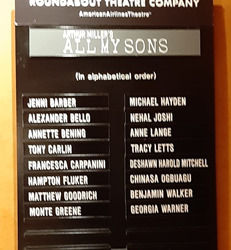
“Frank : Just a minute now. I’ll tell you something and you can do as you please. Just let me say it. He was supposed to have died on November twenty-fifth. But November twenty-fifth was his favourite day.
Chris : Mother!
Mother (Kate) : Listen to him!
Frank : It was a day when everything good was shining on him, the kind of day he should’ve married on. You can laugh at a lot of it. I can understand you laughing. But the odds are a million to one that a man won’t die on his favourable day. That’s known, that’s known, Chris!” (1)

I left the theatre after the performance and headed to Times Square nearby. I needed the bright lights and din of the crowd to calm my nerves. It would have been so nice to have David here beside me to watch the performance. He understood Arthur Miller better than I, no doubt. Theatre was David’s passion – “All that is Human is Art.”
“Chris : You will never let him go till I do it.
Mother : I’ll never let him go and you’ll never let him go!
Chris : I’ve let him go. I’ve let him go a long ------
Mother : (with no less force, but turning from him) : Then let your father go. (Pause. Chris stands transfixed).
Keller (Joe) : She’s out of her mind.
Mother : Altogether! (To Chris, but not facing them). Your brother’s alive, darling, because if he’s dead, your father killed him. Do you understand me now? As long as you live, that boy is alive. God does not let a son be killed by his father. Now you see, don’t you? Now you see. (Beyond control, she hurries up and into the house).”(2)
…………to be continued……………….

David. Image courtesy Tiffany
In the Spirit of David Cornelius Singh
David’s father
Email : [email protected]
https://thinktosee.tumblr.com/
Sources/References
(1) All My Sons (1947), Act 2, p.64. Arthur Miller, Heinemann Educational, 1971.
(2) All My Sons (1947), Act 2, p.66. Arthur Miller, Heinemann Educational, 1971.
1 note
·
View note
Text
The Favourite Movie Review
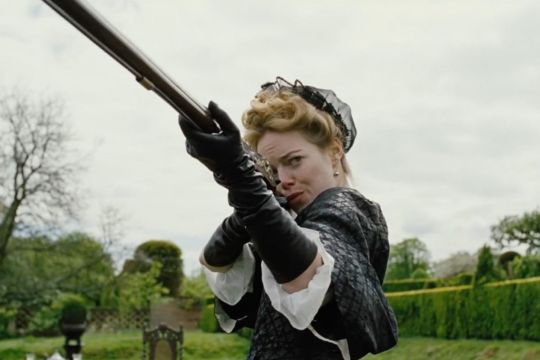
If you happen to suffer from Anglophilia, The Favourite may very well cure you of it. America’s obsession with everything British owes a lot to the fact that movies and TV have painted our overseas cousins as being upstanding, intelligent, and just a little above it all. If Brexit hasn’t killed off that impression for you, take a look at this movie: the court is petty, the most common language is insults, the royal helpers fight like bloodthirsty schoolgirls, and the Queen is mad. How delicious.
It’s the early 18th century, and there are a few issues surrounding the rule of Queen Anne (Olivia Colman); namely, that she’s battier than a thousand-year-old attic. Among her many lovable antics: telling off the servants for things she told them to do, being pushed around in a completely unnecessary wheelchair which she likes being rolled very fast in, falling on the floor and screaming, demanding royal courtesy be paid to an army of rabbits, deliberately making herself sick on sweets, and generally being so out to lunch she frequently forgets there’s a war on with France. In fairness to her, this is England, so remembering when there is and is not a war with France is a full-time job. My only serious regret about all of this is that, while having wheelchair races with herself, she at no point shouts “Vroom vroom”.
These days, we might have sympathy for such an unfortunate soul, but Queens then and now are not so much persons as objects of political desire. The Tory party, here identified only as the opposition, wants to end War With France Number 76b quickly, because the taxes needed for it are taking money out of the pockets of wealthy landowners and, as Tory leader Robert Harley (Nicholas Hoult) sneeringly informs us, putting it in the hands of those darned merchants; one is reminded of the airline shareholders who griped that the employees were getting paid before they did. Anne’s primary confidant is Sarah Churchill (Rachel Weisz, and yes, she’s his ancestor), the Duchess of Marlborough. She wants the war, in which her husband (Mark Gatiss) is a leader, to be funded and fully supported. Just as you think she is the one of the two with the more honorable intentions, the movie corrects you: her support for her husband has more to do with the benefits of being married to a war hero than with any real affection. She is, in fact, shtupping the queen, something left in absolutely no doubt. This is a movie far more frank about sexuality and especially lesbianism than even most indie films dare to be. In that regard, it is incredibly forward thinking; at one point Anne is quite explicit about tongues and her preferred use for them. In other regards the movie’s attitude toward sex is less progressive but no less frank, as it is frequently used to attain power.
This fine arrangement is threatened by the arrival of Sarah’s cousin Abigail (Emma Stone) who has fallen on hard times after her father, from what I could gather, burned down both their house and himself. She initially becomes trusted by the Queen entirely by accident, in fact through the only unadulterated show of good Samaritanism in the entire movie. She will soon learn that in this place, no good deed goes unpunished. She evolves, if you can call it that, until she fits right in with the nearly murderous intrigues of royal life. Sarah pushes: she threatens her life, has her beaten, and attempts to humiliate, ruin and tear her down. Eventually, Abigail will become the better fighter, even engineering a scenario that leaves Sarah rotting in a brothel while she moves to solidify her own position. Nor are Sarah and the Queen the only ones to be used or abused by her. The film goes as far as to subtly suggest she, unlike Sarah, is not even that into sex, as she pursues marriage to a randy nobleman (Joe Alwyn), then loses interest once she has him, and the royal benefits the marriage provides.

What to make of the ensuing battle of wills between the deteriorating Queen, her bickering fixers, and the Parliament? I’ll tell you what not to make of it: the idea that this movie has a feminist viewpoint. It seems that way initially, with both nominal and real power in the hands of a woman. One of the founding, most cherished myths of the movement, though, is that the world would be an inherently better place if women grasped the shorthairs of power. It’s impossible to say if that would be true. What I can say is that the screenplay, written twenty years ago by historian Deborah Davis and “freshened up” more recently by Tony McNamara, practically dies laughing at the idea. It will be tempting for those who want to see Sarah and Abigail in a certain light to say they are only responding to the viciousness of the world they live in, but they voluntarily go far, far beyond any schemes cooked up by the pompous, white-wigged men of the government. The simple truth an attentive viewer might notice early on is that it really, truly would have been possible for the two women to come to some agreement. The other simple truth is that neither wanted to; both wanted to win at the expense of the other. It is not that the men are spared---they are variously pompous, corrupt, callous, or incompetent. It is that power in film is usually shown as mostly corrupting or being corrupted by men, and here women are equally as eager to get in on the game. Sarah’s complicity in this is the most tragic, as it’s clear she really does care about the Queen; yes, at no point does she actually stop trying to manipulate her. No one is spared: even the scullery maids are needlessly cruel.
The main triangle that comprises the heart of the drama is infused with three of the most gripping performances you’ll see at the movies. The irony of Rachel Weisz having her big breakthrough as the nerdy, shy girlfriend of then-more famous Brendan Fraser in The Mummy is strong; she’s since gone on to be the more dominant actor, and it isn’t close. She has one of those mannerisms that can control a room; later, when her more subtle ways of squeezing the Queen have begun to falter in the face of Abigail’s tactics, she gets more forceful, and such is Weisz’s presence that we are shocked when it doesn’t work. Stone’s big hit role in Zombieland was more hard-bitten, but she too would need meatier roles to display what she can really do, and here gets her best to date. She starts out truly just wanting a second chance after going through a hellish youth and being dumped into another bad situation. Eventually, those who would push her to be horrible learn a lesson, as she can be far more vicious than they ever intended.
Somehow, Colman’s Anne is constantly on the verge of sheer, out-in-the-yard-barking-at-the-moon lunacy, yet never devolves to the level of parody, and maintaining her insanity while also not becoming a Jack Sparrow-esque joke must have been among the more demanding things asked of an actor. Most of the water cooler talk centers around the more widely recognized Stone and Weisz, but Colman needs to be both stark raving mad and entirely sympathetic or the movie falls apart; we need to believe this is a person two intelligent, driven, vivacious women would be willing to get in the mud for, even as they manipulate her to their own ends. This is one of the few cases where we can safely impose modern ethics on the past. Anne is mentally ill, and should have been cared for, but there was no chance of that ever happening.
The world her court inhabits has been recreated by director Yorgos Lanthimos, working for the first time since before his critically acclaimed Dogtooth with someone else’s script, as a place that lacks the sumptuousness with which English finery, English dress, English buildings and English everything else are usually treated in American cinema. That’s probably because Lanthimos is Greek, and whereas Britain to us is the ideal parent---upright and mature yet far enough way that we don’t need to call that often---to him it may be just another country in Europe. The halls of St. James’s Palace (My best guess; the film never says) are not particularly ornate or beautiful, or at least they are not portrayed that way. Robbie Ryan chooses to shoot many scenes in near darkness, with candlelight, and the result is that much of the palace appears gloomy, close and not especially grand or even inviting; there is one moment in which Sarah speaks through a door whose other side is hidden by a tapestry when we could well believe the house as a setting for a ghost story. Nor are the actresses spared the visual signs of moral decay. Though the costume department drapes them in every bit of finery you expect from pompous royals, both competing women are literally drug through the mud, and Anne shows little care for her personal hygiene. We are reminded that this was a dirty world in more ways than one, and whatever glamorous ideas we might have of the past are shot out from under us. Like the highly underrated Marie Antoinette, almost the entire movie takes place within the cloistered walls of the royal residence; I doubt most of those involved in the drama ever spare a look for an actual citizen of the crown.
Lanthimos’s last film, The Killing of a Sacred Deer, inspired strong feelings in me. Specifically, it inspired the desire to beat it with a stick. I am morally opposed to films that seek to prove how much smarter they are than the audience. Similar to his more popularly received film The Lobster, The Favourite is quite intelligent in the way it approaches its themes: power, political games, and the puncturing of the myths we build for ourselves surrounding both royalty and the romance of the past. It ascends to greatness because it never once alienates the audience in order to say these things. Just leave your fantasies of ladies and gentlemen in flower at home; those guys aren’t in this movie.
Verdict: Must-See
Note: I don’t use stars, but here are my possible verdicts.
Must-See
Highly Recommended
Recommended
Average
Not Recommended
Avoid like the Plague
You can follow Ryan's reviews on Facebook here:
https://www.facebook.com/ryanmeftmovies/
Or his tweets here:
https://twitter.com/RyanmEft
All images are property of the people what own the movie.
#emma stone#rachel weisz#the favourite#england#movies#olivia colman#joe alwyn#nicholas hoult#mark gatiss#yorgos lanthimos#winston churchill#britain#brendan fraser#france#the mummy#zombieland#robbie ryan#deborah davis#tony mcnamara
29 notes
·
View notes
Text
Two Sides of the Same, aka I wrote something in canonverse for once.
This is kinda sad. It’s angsty. Nobody dies, nobody gets physically hurt, but it’s sort of a tragic meditation on how I see canon USUK in a more “realistic” sense (for whatever that means in this fandom), particularly how I see the character of America/canon!Alfred F Jones. It was supposed to be longer, with an actual conversation between America and England and a resolution and also smut, but upon re-reading it, I feel like adding more would do it a disservice. I really like my prose here, it feels like it’s one of the times I conveyed my intended tone really clearly, so I hope you like it.
Summary: During a UN meeting in New York City, England locks himself in the only bathroom in America’s apartment. It causes America some existential angst.
Rating: Between T and M because America is sexually attracted to England and uses the word “f*ck” in his own thoughts once.
America picks at the carpeting from his spot on the floor, resisting the urge to bang the back of his head on the closed bathroom door he’s leaning against. England has taken himself as a hostage in the only bathroom in America’s New York apartment. America is fairly positive he heard some very muffled sniffling on the other side of the door and so he sits with his back pressed to it, trying to silently will England to forget whatever it is he’s upset about this time with the power of telepathy or something.
There’s a thump against the other side of the door and America knows that England is probably mirroring his position now. A wry, mirthless smirk stretches across America’s lips. He’s got everyone fooled into thinking he can’t read the atmosphere and yeah, sometimes he really can’t, but he knows England and it’s totally not lost on him that even when they’re entrenched in their own private war, they’re still drawn to each other, trying to be as close as possible.
America bites his lip to stifle a groan as all the ways he has ever imagined “as close as possible” between himself and England flood his brain, some fantasies dating back to before his last growth spurt. Not now, he tells himself sternly. But later. Definitely later, after he’s talked England down off whatever metaphorical ledge he’s currently standing on and the older nation is safely asleep in America’s guest room, which is actually just America’s office in this apartment with a daybed wedged into it. He hadn’t really ever expected to have company here, but then the UN happened and then the goddamned Special Relationship came with it. When the economy is better, England stays in a hotel, closer to the UN building, but the economy isn’t that great right now, so somewhere, some humans with high enough security clearance in the depths of their respective governments have decided that England can just stay in America’s office.
It’s usually fine, as long as America remembers to put out the kettle and hit up the store to get a fresh box of Twinnings Earl Grey before England gets there. He never stays that long and America doesn’t really live there either, his actual house is in DC. Where there are actual guest rooms. So this particular apartment has become a sort of… neutral ground. In this apartment, they move like two ballet dancers in a tragic production where the two leads are forbidden to touch. England’s been keeping a few sets of clothing in the office/guest room closet for a few decades, which he began doing after an airline lost his luggage once. He keeps a toothbrush in the bathroom and a couple of toiletries from the UK since he claims not to like American brands.
America has never once given into the temptation to use England’s soap. Really. Might’ve done it once or twice by accident, though.
Of course, the aforementioned kettle is in the kitchen and half-empty boxes of Earl Grey have been piling up forever, so it often seems like England lives in the apartment, even when America is there by himself for any given reason. When America is there alone, he indulges himself in illusions of domesticity, pretending England is only away for a little while, like a human who travels internationally for business, and when he comes home to America, they kiss in the doorway and England lets America take him to the bedroom they share and… damn it. Back to those thoughts.
More sniffling, not so muffled this time since England is against the other side of the door. He probably doesn’t think America is right there to hear him.
Not now, America tells those thoughts again, later. For now, he must bear witness to England’s suffering. And he does know that England is suffering. America is not so much of an idiot that he can’t see it. He suffers also, it’s hard not to right now, given the state of everything in the world. Addendum, he also knows others have it much worse and in many cases, he bears the weight of responsibility for that, but then so does England and why can’t they just be support for each other? Him and England. They could help fix things.
An outright sob sounds inside the bathroom.
America sighs quietly. He knows that this particular situation is not related to the state of the world. It’s more personal. America wants to scream, but swallowing hard, he realizes that he’s hoarse from doing that already.
The landlord will likely receive multiple noise complaints from America’s neighbors and he’s honestly kind of surprised that nobody called the cops on them, but he reasons that it’s New York City. Anonymous capitol of the world.
Another sob.
America’s heart hurts. His mind races through a thousand different universes, in many of those universes, they are just Alfred and Arthur, but he loves England madly in every single one of them. For almost as long as he’s been alive, so to speak, he has loved England madly, even when things were not good between their respective governments and citizens, even when they were legitimately bad, America would lie in bed at night, dreaming without sleeping about having England next to him.
For all of the things that America can remember, he can’t remember the last time he told England he loves him. He knows England wants to hear it, but America isn’t sure that England wants to hear it the way America means it. England probably wants to hear “I love you, big brother, thank you for everything you’ve done for me, I’m sorry I don’t listen to you more often” and what America means is, “I’m in love with you, you crazy old man, I always have been. Can I please fuck you senseless on this table in front of everyone so they know you’re mine?” Except not in front of everyone because most of them have had enough of England as far as America is concerned, and when, dear God, when is it going to be America’s turn? He’s already decided that if his turn ever comes, he’s never letting go. Ever.
The sobbing is more or less constant now.
Why does England have to do this? Why can’t they just talk about it? Screw that whole “stiff upper lip” nonsense. America wants to demand to know what good old-fashioned British repression has ever done for England other than turn him into an angry drunk. The back of his head thunks the door before he can think better of it.
“A-America?”
Shit.
“I know you’re out there. Go away.”
Raw vulnerability bleeds into England’s voice and in that instant, America knows why he represses things. England, not the United Kingdom or even England the country, but England, the beautifully infuriating man sitting on chipped linoleum floor of America’s bathroom, has been hurt so many times by so many different things, including America, so how can he blame the man for being so guarded? Tears fill America’s eyes despite himself.
America sighs loudly enough for England to hear. “Okay,” he says, shifting slightly to make it convincing, but he stays right where he is. He thinks that sitting back to back like this is an apt metaphor for the two of them, as he often finds himself looking fiercely forward to the future while England gazes wistfully back at the past. Normally, this contrast benefits the both of them as America will occasionally whirl England around to see how things will, eventually, get better for everyone and England is almost the only one with the ability to turn America’s eyes to history, however briefly, and remind the younger nation that nothing is forever.
Sometimes, only sometimes, in the most secret parts of himself, America longs for the day when it will be someone else who runs the world, even if that someone is China. If it turns out to be Russia though, America might have something to say about that. But when that day comes, America can take his place beside England in the history books as one of the nations who once ruled the world. Let it be someone else’s responsibility. America’s tiredness exceeds his years, both corporeal and historical. Fear keeps him going at this point--namely the fear that if he doesn’t get everyone to buy into the delusion of his exceptionalism, they’ll all see how weak he really is, how broken and fractured and factioned on the inside, and they’ll take advantage.
It’s the kind of thing he wants to talk to England about, get his advice on, preferably one lazy early afternoon after they’ve spent the whole night and a good portion of the morning making love. England would totally know how to reassure him about his eventual, inevitable fall from superpower status and the ever-increasing probability of violence from such an event. In return, America thinks, he could show England that he is still loved and respected, that America is nearly as fascinated with British citizens and their culture as he is with his own. America imagines having the conversation in this apartment, in his bedroom--their bedroom, bringing in tea for England and coffee for himself, while England tries to untangle his own naked body from the sheets. They’d sit across from each other, actually look at each other for once, and England would put his hand on America’s cheek and say something like, “It’ll be alright, lad. It’s not as bad as you think. You’ll make it through, just as I did, and I’ll be with you the whole time.”
America doesn’t realize he’s crying until he runs an exasperated hand over his face. Oh.
Thank you for reading! I know it doesn’t end like most of my fics do or will, but I started this in November 2017 and I was really just never gonna finish it, but I like the writing in what’s here so much that I wanted to share.
#usuk#aph america#aph england#usuk fanfic#angst#but the genuine kind of angst#the tragic kind that makes you actually feel something#spadian ballad
126 notes
·
View notes
Text
Was Hiruzen a Good Hokage?
No. As many people have already pointed out, Hiruzen was very indecisive, and he always did what his advisors told him to. Which wouldnt be that bad, if not the fact that almost every single one of their decisions were suggested to them by Danzo.
Hiruzen might have had good intentions, but good intentions wont do you much good, if:You orchestrate the massacre of one of the founding clans in your village. You dont react to bullying towards the villages probably most valuable shinobi.You cant even bring yourself to killing one of the greatest criminals from your village
· Suggested Reading
What if a gay person was elected as the POTUS?
We have already had a gay President. James Buchanan Jr. was the 15th President (18571861) He was a member of the Democratic Party.
The only president to remain a bachelor, Buchanan's personal life has attracted great historical interest. Buchanan had a close and intimate relationship with William Rufus King, an Alabama politician. Buchanan and King lived together in a Washington boardinghouse for many years, from 1834 until King's departure for France in 1844.
King referred to the relationship as a "communion", and the two attended social functions together. Contemporaries also noted the closeness. Andrew Jackson called King "Miss Nancy" and prominent Democrat Aaron V.
Brown referred to King as Buchanan's "better half", "wife" and "Aunt Fancy"
------
How did Canada manage to control COVID 19 so well despite its shared border with the US?
When doctors and scientists here in Canada told us that the COVID-19 virus would not only kill some people, but others who contracted the disease might suffer permanent damage to organs and body systems, we listened and became afraid. Then, when it was shown some young children also suffered devastating organ failures, we knew we must all do what we can to protect ourselves and others.
We didnt each need to personally know someone who has been so affected, we just imagined how our own actions could cause this result. For some reason, Americans do not seem to feel that same empathy for their fellow citizens. Tragic and sad
------
What is the significance of WhatsApp for Facebook?
Why did Facebook acquire WhatsApp at such a hefty price of $19 billion?
Let us think about it. Say you are talking to your girlfriemd and you decide to go for a movie coming weekend.
It is not a big information for you. But for facebook it is a priceless piece of information. Since it they know now that you ar going to the movie they will project all the ads that is pertaining to movie going.
. Hence facebook achieves a greater accuracy of targeted ads. And hence 19Billion dollars.
Also facebook knows everything about you except your messages to your intimate people. Now that they bought whatsapp they literally know everything about you to sell you out when the time comes.
------
Will Joe Biden be worse than Trump?
Worse at what? I guess it depends on what you value and what you place importance on. If youre a Republican partisan it doesnt matter what Biden does itll be worse than Trump.
If youre a Democrat partisan it doesnt matter what Biden does because itll be better than Trump. If youre an independent youll recognize that all Presidents have pluses and minuses. Theyll do things at annoy you and things youll applaud.
I didnt vote for Trump in 16 and hes done things I despise and things I applaud. I didnt vote for Obama either time and he did thinks I liked and things I hated
------
Do many Chinese people hate Fujianese people?
I don't know where did you get this view.
In college, I had a roommate coming from Fujian who is an authentic, courteous, helpful person with lots of computer's knowledge. Every time our computers occur in problems, our first thought is to seek for his help not to go maintenance store straightly because of its expensive charge. There are a few Fujianese.
as far as I'm concerned, They all good person through conversation and cooperation. But, I can't say Fujianese all good people since I had met all good Fujianese. In working with people, The significant thing We need to do is giving our sincere heart to them.
Similarly, you will be rewarded for your sowing.
------
How old should a kid be before seeing Deadpool?
FWIW, the airline cut is devoid of *all* sexual content (to the point of blurring out the slight glimpse of butt-crack visible in the opening credits, as well as losing the Stan Lee cameo), but I dont believe they removed *any* of the violence or swearing.
What a country!As for child-appropriateness, it depends on the child. I was OK with my kid seeing the airline cut because he never swears and he doesnt like gory violence (it wasnt too gruesome on my 5 phone screen).
Other kids his age may not be able to handle this material. Heck, I know adults who wouldnt do so well with this material
------
How can we stop people from throwing garbage in the empty plots?
Please know that if people throw biodegradable garbage only in an empty plot after removing all plastics and dry wastes, you are actually replenishing the ground.
This will improve vegetation of the plot.The second approach is to promote home composting and community composting. This can happen only if there is source segregation.
Third approach is to penalize through a law.Instal leaves composter in the entrance of the plot and encourage people to deposit the dried leaves into it. Many aesthetically good looking composters are available.
The process is very simple and no stink involved.Be creative and you will have many more options. Cheers.
------
Could we derive energy from gravity in space?
You mean free flowing gravity? Yes.
Look at a grandfather clock and see the weights it has to keep it going. Except for dams most of the ways are small but all together make up huge amounts. You could use the same clock system method with a much larger counter weight and just by hand moving it back up daily to the top would generate constant power.
In other words you could produce huge amounts of potential power by a little daily hand labor.Now you got me wondering if there is a natural limit it this because it is not being done or that people are just lazy in not doing this
------
How will the GOP change if Trump loses to Biden?
I dont think they will change at all, at least in the short term.
Trumps presidency has done one useful thing - exposed the corrupt innards of the Democratic party, and the Republicans, with or without Trump, are going to want to follow through on things, especially when the Durham report comes out. Trump has also shown how to do things economically, such that even Biden wants to plagiarize him. Theres been absolutely nothing wrong with his policies.
They were working great prior to the pandemic and theres no reason to think they wont work again when things finally get back to normal
------
Who is the best teacher for sociology for the UPSC optional preparation in Delhi?
Hello there .I am a Civil engineer , who did not have any prior knowledge about sociology .
I was an expressive person and with the suggestions of friends , I chose sociology as my optional .I went to Pranay Aggarwal Sir and that was the best decision I made . Reasons :-He took classes in small batches with led me to focus more on the subject .
He is very interactive which makes sociology come out very naturally from oneself .He is very helpful and extremely accepting of different ideas which gave me confidence and started loving the subject . His notes are all encompassing and I can vouch for it
------
Why was Paul Manafort sent to prison?
This just reported by NY Times:Banker Accused of Arranging $16 Million in Loans to Manafort to Gain High-Level Trump PostA banker in Chicago has been changed with trying to buy an appointment as Treasury Secretary. He arranged $16 million in loans to Paul Mafort. I dont know if the prosecutors knew about that alleged crime when Manafort was sent to prison.
This news certainly speaks to what kind of person Manafort is. It continues to astound me how corrupt Trump is that he picks people like Manafort. How can Trump voters have been so clueless to have voted for this narcissistic(oops, I better restrain myself).
------
Why was the Roman Empire so successful?
the roman empire was successful in its government form.it probably had the most advanced government in ancient times, a republic which represent each of the classes in society.
Outsiders or barbarians could also aspire to gain citizenship if they work hard enough, slaves could gain or buy their freedom. This makes roman empire have a equal opportunity system similar to the american dream.But things slowly deteriorated once ceasar become dictator for life, or sulla and marius trying to monopolize power through using the military triumphs.
It lead to rise of emperors and rulers not acccountable to the public, and right to rule slowly degenerate into hereditary succession or military coup.
------
Did the music of led Zeppelin change your life?
Yes!
As does every song does, some more than others. The Rain Song played while I was enjoying the company of a young lady I met on Manhattan Beach as I was coming out the ocean, exhausted from surfing for 5 hours. I collapsed on my board and was laying there taking in the scene when this beautiful blonde girl with curly hair, piercing blue eyes, and a body of a Black girl, blocked the sun, looked down and said are you ok?
. That was the beginning of summer of 91 and we had fun. Especially the night we spent in a motel on the beach, listening to led Zeppelin
------
Who is the most under appreciated American president?
Adams greatest war president in our nations history.When almost everyone in the young country wanted war with France egged on by that snake Jefferson. Adams held back, he understood war was not necessary would be destructive and would cripple the country for decades, he also well understood his stand would likely cost him his reelection but he stood firm.
The country did not go to war but he did loose his office. Such a shame the country remembers the man who did his most noble service as a citizen under an English king and not the man who formed the nation after the Revolutionary War
------
Why did you leave Hinduism for Islam?
People group or regroup into religion for rudimentary security reasons, not due to any love for a religion.
Any person who understands the first alphabet of any religion will know the purpose of religion is to help and serve the society he or she lives selflessly, particularly those who donu2019t follow his/her beliefs and faith has to be served, loved and cared.If someone thinks that his/her religious group is better than the other, it discredit the fundamental first alphabet of the religion. Islam, Hinduism or any religion in the world, if it is practiced by grouping and subgrouping its practioners, it is deplorably divisive for the society and in general human welfare
------
In WW2 during the Battle of France, why did it take so long for France to surrender?
Why didn't France surrender earlier?
France waited so that the English could be evacuated from Dunkirk. They held the German back while the small boats could get in and get the boys home.
Then they had a resistance to organise not easy when you have a whole lot of tanks running over your toes. Finally, the Italians decided to pop in for a late entry in the game of conquest so they had them to send packing. Then they surrendered.
That is to say the French Government surrendered, the French people on the other hand fought on.If you have ever seen Monty Python and the Holy Grail, you see just how ferocious the French can be in their taunting of opponents.
0 notes
Text
The Decade's Most Memorable Events In 10 Minutes
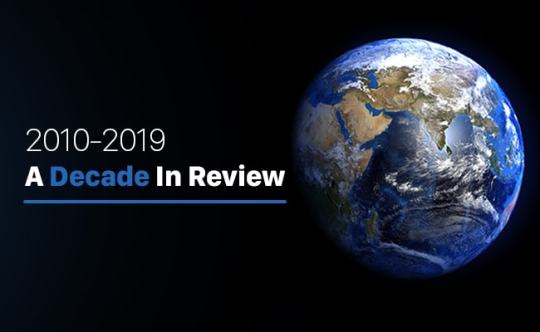
2010-2019: A Decade In Review - Highlights of events from around the world between 2010 and 2019New Delhi: While most of us have been busy on our phones, a decade has gone by. How significant has it been? Well, the manner in which the way of life has changed this decade has been the most significant in over a century. The way we live, work, eat, travel, and entertain has changed almost entirely - and our smartphones are what is leading the way. From getting a cab to ordering groceries, banking to making reservations, everything became just-a-click-away in the last ten years. But while we might have been busy in the virtual world, tapping away on our screens, a lot has happened in the real world too, and even out in space.Here is a comprehensive list of the decade's most memorable events for you to journey through, in nostalgia, thinking about the better moments fondly, learning from the mistakes made, celebrating the achievements, and remembering all those who won't journey on with us to the next decade.2010: The Year In Review
Apple founder Steve Jobs unveils the world's first iPad; Instagram is launched; WhatsApp comes to India; Uber and Ola make debut; Netflix starts expanding its streaming service to the international market; WikiLeaks is founded by Julian Assange; Burj Khalifa becomes the tallest building in the world; Iceland's Eyjafjallajokull volcanic eruptions cause enormous disruption to air travel; Scientists in a South African cave discover 2-million-year-old fossils of a new species called Australopithecus Sediba, which are potentially the ancestors to Humans. India's BrahMos missile, jointly developed with Russia, sets the world record for becoming the world's first and fastest supersonic cruise missile; Arab Spring protests spread across the middle-east and north Africa; Pakistan is devastated by massive floods resulting in one of the worst humanitarian disasters in the country's history as 20 million are affected, 14 million left homeless; Ireland and Greece face a grave economic crisis; BP oil spill, also known as the Deepwater Horizon oil spill in the Gulf of Mexico becomes the largest maritime oil spill in history; 16-year-old Justin Bieber becomes the youngest solo male to hit #1 on the album chart since 13-year-old Stevie Wonder in 1963; Australia elects its first female prime minister; Indian-American Ajay Banga takes over as CEO of Mastercard; Dozens of asylum seekers drown as the boat they were in crashed into rocks near Christmas IslandThose who left us in 2010: Jyoti Basu 5-time chief minister, and arguably West Bengal's tallest leader after India's independence.2011: The Year In Review
Operation Geronimo: Osama Bin Laden is killed; India wins the cricket world cup; Scientists discover Kepler-22b - An extrasolar planet orbiting within the Goldilocks zone or habitable zone of the Sun-like star Kepler-22. The planet is nearly 2.5 times the size of Earth and has a 290-day year; Formula One comes to India - Indian Grand Prix held at the Buddh International Circuit in Noida; Anna Hazare's Lokpal movement leads anti-corruption drive, protests; Royal Wedding: Prince William, Duke of Cambridge and Catherine, Duchess of Cambridge marry; Dominique Strauss-Kahn is arrested for assault in the US; Japan is hit be a massive earthquake and tsunami, which leads to the Fukushima nuclear disaster in the country; News of the World shuts down; Occupy Wall Street protests surge; SpaceX announces plan for the world's first fully reusable rocket; Swiss tennis ace Roger Federer becomes the second most respected, admired and trusted individual in the world after Nelson Mandela.Those who left us in 2011: Apple founder Steve Jobs; Elizabeth Taylor, one of Hollywood's most iconic actresses dies at 79; Grammy Award winner Amy Winehouse2012: The Year In Review
Nirbhaya gang rape in Delhi; The rise of Arvind Kejriwal and the Aam Aadmi Party; Pakistani terrorist Ajmal Kasab, who was one of the terrorists in the 2008 Mumbai terror attacks hanged; Scientists discover the existence of the Higgs boson or God particle; NASA's Voyager 1 spacecraft becomes the first human-made object to leave the solar system and venture into interstellar space; Facebook goes public, launches IPO; Barack Obama re-elected as US President; Vladimir Putin is re-elected as Russia's President; Elon Musk first mentions the concept for a "fifth mode of transport", calling it Hyperloop; Hurricane Sandy causes widespread disaster in the US; Sandy Hook Elementary School shooting leaves 27 dead in US; Red Bull Stratos: Millions watched LIVE as Austrian skydiver Felix Baumgartner jumps from the edge of space (128,100 feet) wearing a spacesuit - Records set: Balloon altitude record and sound barrier broken.Those who left us in 2012: Nirbhaya dies two weeks after the attack; American singer Whitney Houston dies at 48; Neil Armstrong, US Astronaut and first person to walk on the Moon, dies at 822013: The Year In Review
Sachin Tendulkar retires from all forms of cricket; Commander Abhilash Tomy of the Indian Navy becomes the first Indian to complete a solo, non-stop circumnavigation of the world under sail; Massive floods across north India leaves nearly 6,000 dead, becoming India's worst natural disaster since the 2004 tsunami; Kedarnath flood: Large-scale destruction in surrounding areas, but Kedarnath temple unaffected; Video shows massive Chelyabinsk meteor entering Earth's atmosphere over Russia; Scientists study the air trapped in the Antarctic ice and find that 2013 is the first time in 800,000 years that we have over 400 parts per million of carbon dioxide in the Earth's atmosphere; Boston Marathon Bombing: 2 homemade pressure cooker bombs detonated 14 seconds and 210 yards apart leave more than 264 injured; Black Lives Matter movement gains momentum; Coup overthrows Egyptian government; Malala Yousafzai survives assassination attempt; Xi Jinping is elected as the President of China; Edward Snowden exposes US's NSA surveillance program; Bitcoin demand surges; Jeff Bezos buys Washington Post; Twitter goes public, launches IPO; Alibaba goes public, launches IPO.Those who left us in 2013: Former South African President and global icon Nelson Mandela dies; The Fast and the Furious star Paul Walker tragically dies in a high-speed car accident; 'Lawrence of Arabia' star Peter O'Toole dies at 812014: The Year In Review
"Modi Wave" across the country; Narendra Modi is elected Prime Minister of India, forms a majority government after the World's largest ever elections held till now; MH370 disappears: Malaysia Airlines Flight 370 mysteriously disappearance mid-flight; India becomes the first nation to successfully reach Mars in the first attempt; ISIS takes Mosul, expansion of ISIS gains momentum; The Ice Bucket Challenge goes viral on social media, to promote awareness about ALS (Amyotrophic Lateral Sclerosis); Sydney hostage crisis: A gunman with an ISIS flag takes dozens of people hostage at a Lindt Cafe in Sydney; ISIS offshoot Boko Haram spreads across north Africa, especially Nigeria; Boko Haram kidnaps 276 girls from a college in Nigeria's Chibok; Over a hundred missing even today, many feared dead; India safely brings back 46 nurses from ISIS captivity in Iraq; Mount Everest Avalanche: Ice avalanche kills 16 climbing sherpas, injures 9 others; Satya Nadella takes over as Microsoft CEO; Shashi Tharoor's wife Sunanda Pushkar found dead in her hotel room in Delhi; Annexation of Crimea by the Russian Federation; Rosetta's Philae lander becomes the first space probe to soft land on a comet (Comet Churyumov-Gerasimenko); Malaysia Airlines Flight 17 (MH17) shot down by a surface-to-air missile over Ukraine; North Korea hacks Sony Pictures.Those who left us in 2014: Robin Williams commits suicide; American poet and civil rights activist Maya Angelou dies; Lauren Bacall, one of Hollywood's iconic actresses dies at 89; American comedian and actress Joan Rivers dies2015: The Year In Review
Nepal is devastated by a massive 7.8 earthquake - nearly 9,000 dead, 22,000 injured, 3.5 million people homeless; Himalayan earthquake leads to avalanche on Mount Everest, killing at least 22 people, making it the deadliest avalanche to hit the world's highest peak; Operation Raahat: Indian Armed Forces and the Ministry of External Affairs evacuate more than 5,600 people, including 960 foreign nationals from Yemen during the 2015 military intervention by Saudi Arabia and its allies; Wing Commander Pooja Thakur of the Indian Air Force becomes the first female officer to lead the Guard of Honour at Rashtrapati Bhavan during the visit of then US President Barack Obama; Sheena Bora murder case: Indrani and Peter Mukerjea arrested; Volkswagen emission scandal - findings cover 482,000 cars in the US alone; US legalises same-sex marriage; Greece plunges into severe debt, pressuring EU; Dramatic visuals of the TransAsia Airways Flight 235 crash in Taiwan shocks the world; 'Je suis Charlie': Charlie Hebdo terrorist attack in France condemned globally; India initiates the International Solar Alliance in major step towards green energy, 121 other countries join; Sundar Pichai takes over as Google CEO.Those who left us in 2015: Renowned scientist, teacher and former President of India APJ Abdul Kalam dies at 83; Grammy-winning blues legend BB King dies at 89; Leonard Nimoy, Spock from Star Trek, dies at 832016: The Year In Review
Demonetisation in India; India carries out surgical strikes on terror launch pads across the Line of Control in Jammu and Kashmir; Indian national Kulbhushan Jadhav abducted from Iran, held captive by Pakistan; Mother Teresa canonised posthumously as 'Saint Teresa of Calcutta' by Pope Francis at a ceremony in St Peter's Square in Vatican City; Brexit Vote: Britain votes to leave the EU - The British Exit is termed Brexit; 'Obama Out': President Obama drops mic on stage as a symbol of the end of his presidency; Donald Trump is elected as US President; Amazon Prime Video launches worldwide; The historic Paris Climate Agreement in signed to take effective measures against Climate Change; Scientists invent the Crispr-Cas9, a unique technology that enables medical researchers to edit and delete DNA, thereby allowing effective genetic engineering; Florida nightclub shooting: Omar Mateen kills 49 people and wounds 53 at a gay nightclub in Orlando; Dhaka Cafe Attack: 5 terrorists take dozens hostage at the Holey Artisan cafe in Dhaka, kill 22 civilians, 2 cops; Scientists and researchers successfully detect the first direct evidence of gravitational waves, using the Laser Interferometer Gravitational-Wave Observatory or LIGO - The existence of gravitational waves was first predicted by Albert Einstein in 1916; Pokemon Go, an augmented reality mobile game, got millions of people out on the street; Leonardo DiCaprio wins Oscar for The Revenant; Brangelina divorce: Angeline Jolie files for divorce from Brad Pitt.Those who left us in 2016: Tamil icon and former chief minister Jayalalithaa dies at 68; American singer-songwriter Prince dies at 57; English singer-songwriter George Michael found dead in his bed in his home in England; Singer-songwriter David Bowie dies at 69; Alan Rickman, who played Hogwarts professor Severus Snape in Harry Potter dies at 69; Legendary boxer Muhammad Ali dies at 74; Cuban communist revolutionary Fidel Castro dies at 902017: The Year In Review
One nation, one tax - India adopts GST, biggest reform since opening of the economy; Kulbhushan Jadhav sentenced to death by a Pakistani military court - India, denied consular access on multiple occasions, takes Pakistan to UN court ICJ; India's ISRO set the world record for the largest number of satellites ever launched successfully on a single rocket - 104 satellites; The India-China border standoff at Doklam lasts 73 days; SpaceX's Falcon 9 rocket becomes the world's first reusable rocket to successfully complete a mission; Phase 1 of the Iran-India Chabahar Port opens; Indian priest Father Tom Uzhunnalil rescued from ISIS captivity in Yemen, returns safely to India; London's Grenfell Tower fire: 72 people die, 70 others critical in one of Britain's worst fires; Texas church shooting - 26 people killed in mass shooting by Devin Patrick Kelley in Sutherland Springs in US; Las Vegas Strip shooting: Stephen Paddock opens fire on a crowd of concert-goers, killing 58 people and wounding 413; Charlottesville white supremacy march gathers momentum; Australia legalises same-sex marriage; #MeToo movement spreads across the world; Harvey Weinstein sexual abuse cases - Dozens of women reveal they were raped, assaulted and sexually abused by Weinstein over a 30 year period; Oscars faux pas: La La Land was given the Best Picture award, only to be take away and given to Moonlight, causing a massive embarrassment at the Oscars;Those who left us in 2017: Legendary comedian Don Rickles dies at 90; Playboy founder Hugh Hefner dies at 91; Rock 'n' roll music pioneer Chuck Berry dies at 90; Linkin Park singer Chester Bennington commits suicide; American musician Tom Petty dies at 492018: The Year In Review
Tesla Motors' sports car orbits Earth with astronaut at the wheel; India decriminalises section 377 - consensual homosexual sex between adults; India and Oman sign agreement under which India gets access to the facilities at Duqm for the Indian Air Force and the Indian Navy; India completes nuclear triad (Air, land and sea, undersea ballistic missile capability): Completion of the nuclear triad with the first successful deterrence patrol by INS Arihant; Kerala devastated by floods: Nearly 500 dead, 140 missing, over 2 lakh people homeless; India brings back the mortal remains of 39 Indians killed by ISIS in Iraq's Mosul; Air India makes history, becomes first and only airline in the world to fly to Israel over Saudi airspace; India's 'Statue of Unity' becomes the tallest statue in the world; Roger Federer becomes the first male tennis player to win 20 grand slams; The Facebook-Cambridge Analytica data scandal; Royal Wedding: Britain's Prince Harry, Duke of Sussex and Meghan, Duchess of Sussex marry; Indra Nooyi steps down as CEO of PepsiCo Inc after 12 years in office; California wildfires in the US; Associate Justice of the US Supreme Court Brett Kavanaugh faces sexual assault allegations; US-China trade war begins; Saudi author and columnist Jamal Khashoggi who fled in 2017, killed in Turkey; Tham Luang cave rescue: The miraculous cave rescue in Thailand - 12 boys of a football team, aged 11 to 16, and their 25-year-old assistant coach enter a cave which gets flooded. The rescue ops take 18 days; US House of Representatives passes bill and allocates funds to build the US-Mexico border wall.Those who left us in 2018: Former Prime Minister of India Atal Bihari Vajpayee dies at 93; Tamil icon and former chief minister Karunanidhi dies at 94; Bollywood actress Sridevi dies at 54; Legendary American comic book writer Stan Lee, creator of Spider-Man, Iron Man, Hulk, and many more, dies at 95; Celebrity chef and author Anthony Bourdain commits suicide at 61; Swedish DJ and electronic artist Avicii (real name: Tim Bergling) commits suicide at 28; Former US President George HW Bush dies at 94; Former US Senator John McCain dies at 82.2019: The Year In Review
World celebrates the 150th year of Mahatma Gandhi's birth; Narendra Modi is re-elected Prime Minister of India, forms a 2nd majority government after the World's largest ever elections till now; Supreme Court of India delivers its verdict on the Ayodhya land dispute case, settling one of the longest disputes globally; India sends its second lunar exploration mission, Chandrayaan-2; India-American Abhijit Banerjee wins the Nobel Prize in the field of Economic Sciences; Balakot airstrikes: India carries out pre-emptive airstrikes on a JeM terror training facility in Pakistan's Balakot; Parliament of India declares the practice of Triple Talaq illegal and unconstitutional; Kulbhushan Jadhav case: International Court of Justice rules in favour of India - 16-judge UN court bench ruled 15-1 in favour of India, stops Kulbhushan Jadhav's execution, tells Islamabad to give consular access; India revokes the "temporary" Article 370 from its Constitution; Jammu and Kashmir, Ladakh become union territories; India successfully tests anti-satellite or ASAT weapon under the mission code-named Mission Shakti, becomes a space power; Sundar Pichai takes over as CEO of Alphabet - Google's parent company; Notre-Dame de Paris fire: Massive fire at the Notre-Dame Cathedral in France; Flight Lieutenant Bhawana Kanth become India's first woman air force pilot to qualify to undertake combat missions on a fighter jet; Sub-Lieutenant Shivangi of the Indian Navy becomes its first woman pilot; Pakistan-based terrorist Masood Azhar designated a global terrorist by the UN Security Council; Donald Trump becomes the first sitting US President to set foot in North Korea; Operation Kayla Mueller: ISIS chief Abu Bakr al-Baghdadi killed by the US military; India's fastest train - Train 18, also known as Vande Bharat Express, flagged off by PM Modi; India announces plan to launch its own space station; missions to Mars, Venus, and Sun; Sri Lanka Easter bombings: 259 people killed, over 500 injured after 3 churches and 3 luxury hotels are targeted in a series of coordinated terrorist suicide bombings; New Zealand's Christchurch mosque shootings: Gunman kills 51 people, injures 49, live-streams the attack on Facebook; American financier and convicted sex offender Jeffrey Epstein commits suicide; Walmart shooting: El Paso, Texas - A gunman shot and killed 22 people and injured 24 others; Families of illegal migrants separated at the US-Mexico border - Children separated from parents; Hong Kong Protests: Anti-China protests rock Hong Kong; First black hole image captured on camera, viewed by 2 billion people worldwide; Climate activist Greta Thunberg makes powerful speech at the UN Climate Change summit; Students across the world protest demanding climate action; Anti-CAA, Anti-NRC Protests: Protests across India over the Citizenship Amendment Act and the National Register of Citizens; Donald Trump Impeached, becomes the 3rd US President to be impeached in the House of Representatives after .Those who left us in 2019: Former Defence Minister and Chief Minister of Goa Manohar Parrikar dies at 63; Former chief minister of Delhi Sheila Dikshit dies at 81; Former Foreign Minister and senior BJP leader Sushma Swaraj dies at 67; Former Finance Minister and senior BJP leader Arun Jaitley dies at 66; Renowned lawyer Ram Jethmalani dies at 95.
Read the full article
#010oct161920#1bbc#1minutenews#2killednews#2tradecenternews#247anchor#3news#3warglobalnews#6abctonight#6anchors#7cup#7record#7recordattempt#8aloysiusaloysius#8mediacorp#8singapore#8twitter#8worldfacebooklive#8worldfb#8worldlive#8worldorchardtower#9cup#9msnnews#9record#911news#91101record#apquiz#abc4am#abcnews#abc7tonight
0 notes
Text
LUCY THE LAUNDRESS
S2;E17 ~ January 12, 1970

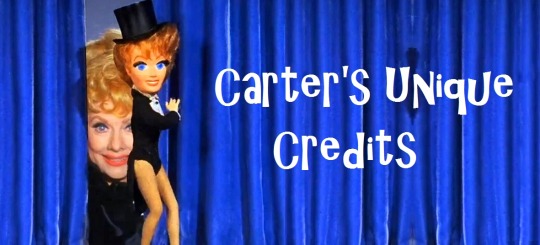
Directed by Herbert Kenwith ~ Written by Larry Rhine and Lou Derman
Synopsis
After bragging to Craig about her perfect driving record, Lucy smashes into a laundry truck. In order to pay for the repairs, she has to go to work at the laundry and keep her identity a secret when Kim and Craig are suddenly plagued with clothing stains.
Regular Cast
Lucille Ball (Lucy Carter), Gale Gordon (Harrison Otis Carter), Lucie Arnaz (Kim Carter), Desi Arnaz Jr. (Craig Carter)
Guest Cast

James Hong (Lee Wong) was born in 1929 and began his screen career in 1954. He has lately been acclaimed as the voice of Mr. Ping in the Kung-Fu Panda franchise. Aside from his nearly 500 screen credits, Hong is one of the founders of the East-West Players, the oldest Asian American theater in Los Angeles. At Desilu, he unsuccessfully auditioned for the role of Sulu in “Star Trek.” This is his only appearance with Lucille Ball.
Mr. Wong is a widower with two young girls. He operates Lee Wong's Hand Laundry on Pine and Hurst.

Lauren Gilbert (Mr. Michaels, Insurance Adjuster) played recurring characters on “Edge of Night” and “Hazel” - both named Harry. This is his only appearance with Lucille Ball.
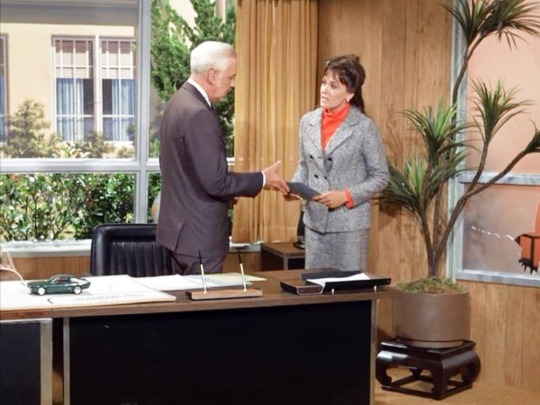
Bee Thompkins (Secretary) had only a handful of other screen credits between 1969 and 1972. Also in 1970, she was one of the passengers in the blockbuster film Airport. She was variously credited as ‘Bea Tompkins’ during her career.
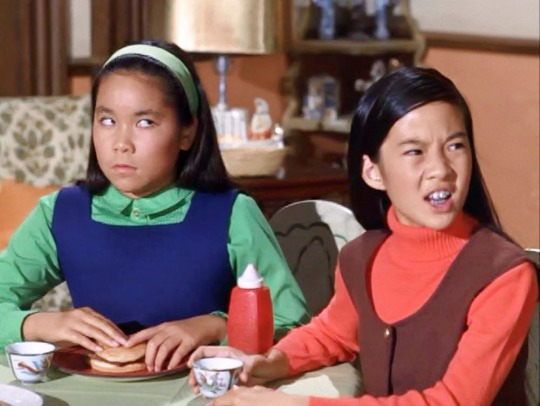
Rosalind Chao (Linda Chang Wong, right) made her screen debut with this episode. She created the role of Soon-Ye Klinger on “M*A*S*H” and “After M*A*S*H” but is perhaps best known for playing Keiko O'Brien on “Star Trek: The Next Generation” and “Deep Space Nine.” During that series she also filmed The Joy Luck Club. She recently guest-starred on TV's “Blackish,” “This is Us,” and “The Catch.”
Heather Lee (Sue Chin Wong, left) makes her only screen appearance in this episode.
Linda Chang and Sue Chin are sisters and the daughters of Lee Wong.

Romo Vincent (Laundry Customer) was a Broadway performer from 1942 to 1959. He played an airline passenger in “Lucy Flies to London” (TLS S5;E6). This is the first of his two episodes of “Here’s Lucy.”
Vincent was cast for his size. He claims his shorts are size 52.
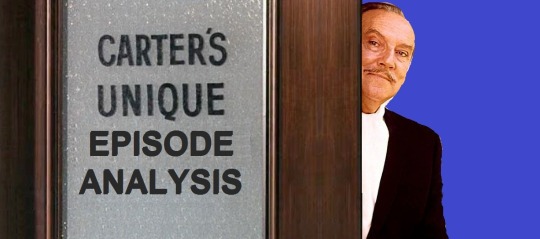
This is the first of nine episodes written by Larry Rhine and Lou Derman. Rhine had been nominated for an Emmy Award in 1963 for writing for “The Red Skelton Show.” He was nominated again in 1978 for an episode of “All in the Family.” Derman was also an Emmy nominee for “All in the Family.” Together they also wrote many episodes of “Mr. Ed.”
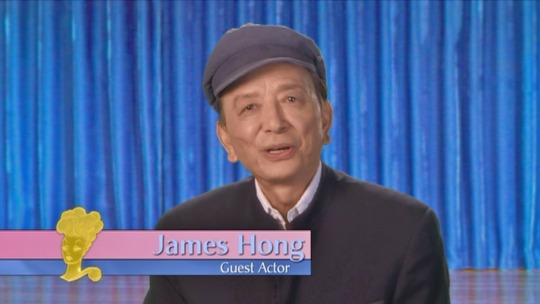
In his DVD introduction to the episode, James Hong tries to diffuse any misinterpretation of Lucy's disguising herself as an Asian character.
“Sometimes it's very offensive for the Asians to see that kind of image. But she was in essence playing that character pointing out how society had this cliched image of the Asians. So she was laughing at herself and and laughing at the society's concept of Asians. To contrast that they had me dress up in this wonderful suit – very elegant!”

In the opening scene, Lucy comes home with a bag of groceries containing Cheerios. On the bottom right corner of the box it states that a free Super-Ball is inside. [In the inset photo it is for Wacky Racers as a Super-Ball box was not available.] During the summer of 1969, scores of American kids begged their parents to buy the General Mills cereal to get the amazing Super-Ball inside.
Next to that is a box of Nabisco Rice Honeys, also a breakfast cereal. The cereal was first marketed under another name in 1939 and, after several more name changes, was discontinued in 1975. What is unique about this particular box is that it includes free Beatles’ Rub-Ons promoting their movie Yellow Submarine. The film was released in November 1968, about a year before filming. If you saved one of those boxes, they're currently going for over $1,000. In 2014, someone sold one for $1,430.50 at auction!
At the office, Lucy gets a call from Mary Jane. The character does not appear in this episode, but is played by Mary Jane Croft.
Harry is looking for the Treshkin contract.

The car accident costs Lucy $97.50. When Lucy doesn't have money to pay for the damages to Wong's van, he suggests she should “Sell car. Take bus. Leave driving to us.” This was a paraphrasing of the advertising slogan of the Greyhound Bus Company. It was previously quoted in “Lucy Helps Craig Get a Driver’s License” (S1;E24) and “Lucy and the Used Car Dealer” (S2;E9).
When Sue Chin Wong learns that Lucy will be working for her father, she exclaims: “Well, there goes the neighborhood!” This was a common expression used to grouse about integration, which was a hot topic in the late 1960s. To further reinforce the role reversal comedy, the writers give the line to an Asian character.

When Lucy meets Wong's daughters, she greets them in an exaggerated and condescending Chinese accent. The girls look horrified and answer back in voices totally devoid of any Asian influence. To further the humor of Lucy's backward thinking, the girls are eating hamburgers with ketchup, a typical American-style meal.

Mr. Wong's daughters inform Lucy that their father only pays sixty five cents an hour. In late 1969 the minimum wage was $1.30 per hour, but rose to $1.45 per hour in February 1970. The girls explain that their dad thinks that because he's Chinese he can pay “coolie” wages. The word “coolie” refers to an unskilled native laborer generally from India, China, or some other Asian country. Depending on the context, this word can be considered offensive or pejorative.
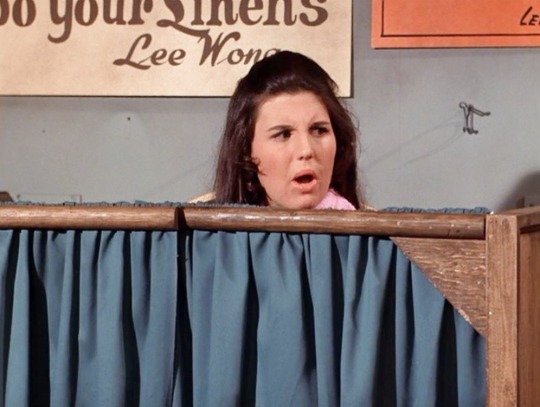
When Kim enters the shop to get a stain out of her new dress, Lucy disguises herself with a bright kimono, thick eyeglasses, and a fringed red lampshade on her head. She disguises her voice to a stereotypical Asian accent by changing her Rs to Ls (ie: “tellycroth lobe”).
After Lucy's true identity has been revealed, Harry says “Well, if it isn't Madam Butterfly.” He is referring to the title character in Madam Butterfly, an Italian opera by Giacomo Puccini that premiered in 1904 and is still in the classical repertory today. In the opera, a 15 year-old Japanese girl falls in love with an American sailor with tragic consequences. The story was also the inspiration for the Broadway musical Miss Saigon (1989) and the play M. Butterfly (1989).

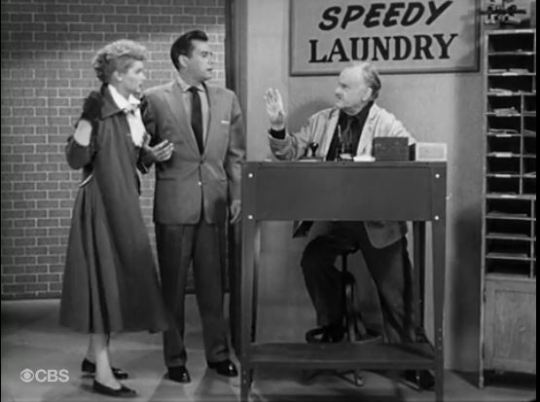
Lucy Ricardo also caused havoc at a laundry in “Bonus Bucks” (ILL S3;E21).

Lucy tells Craig that Mr. Wong is a decorator who is there because she is considering doing the house over in Chinese Modern. Chinese Modern was the style that Carolyn Appleby redecorated her apartment in “Lucy Tells the Truth (ILL S3;E6). Sworn to be truthful, Lucy says it looks like “a bad dream you'd have after eating too much Chinese food.”

Lucy fibs to Craig that Mr. Wong decorated Grauman's Chinese Theatre (everything but the footprints). The iconic Hollywood movie palace was the setting of “Lucy Visits Grauman's” (ILL S5;E1) and the footprints were integral to that episode and the following one, “Lucy and John Wayne” (ILL S5;E2).

Lucy Carmichael also disguised herself as an Asian character in “Lucy and the Soap Opera” (TLS S4;E19).
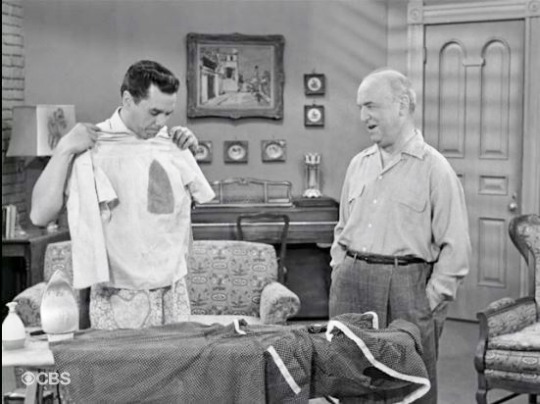
Lucy Carter's ironing skills seem no better than that of Ricky Ricardo and Fred Mertz, who both left their ‘marks’ on the laundry during “Job Switching” (ILL S2;E1).
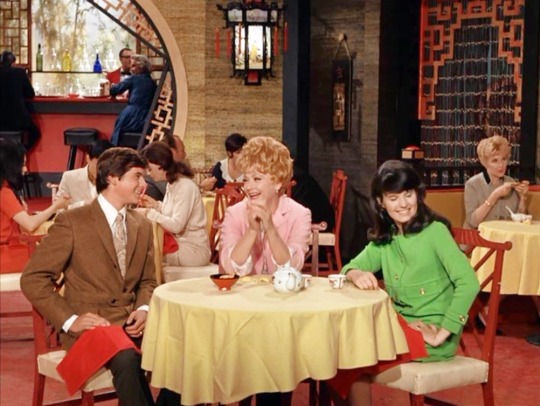
In season one, Lucy Carter celebrated her birthday at a Chinese restaurant.

Ouch! Lucille Ball accidentally scalded her hand during the filming when using the steam press. This is ironic, since the dialogue has Mr. Wong warn Lucy to be “careful with the steam iron” when he first agrees to let her work off her debt.
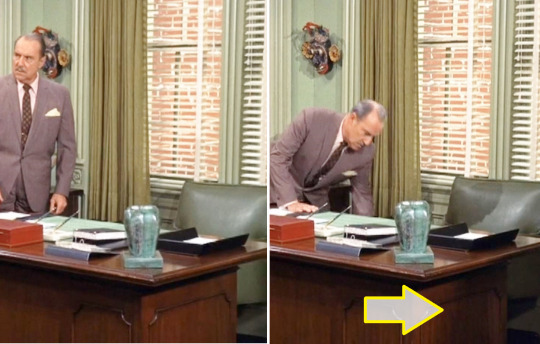
The Shadow Knows! There is a moving shadow across the side of the desk when Harry bends down to get a key from the drawer. The next shot is a close-up (below), which necessitated the camera move that caused the shadow.

Props! Harry offers Lucy a mini-bottle of booze that he got on a flight to Hawaii. It is hidden inside the jade green desk ornament that coincidentally makes its debut with this episode – and disappears thereafter. In the above photo, the bottle is difficult to see. Only the neck of the tiny bottle with its white seal can be seen.

Where the Floor Ends! This time the floor ends in the Chinese Hand Laundry.
Sitcom Logic Alert(s)!
From the time Harry hears Lucy's collision outside his window to Lucy's entrance into the office is a mere 8 seconds! Take into account that she says she left a note for the owner on his windshield – and put the windshield in the front seat!
Mr. Wong arrives with an estimate of the damages on the very same day as the accident.
At the laundry, Lucy immediately knows how to work a commercial laundry press with no instruction.
Even with the accent and disguise, Kim should probably recognize her own mother's voice.

Oops! When Lucy trips and her hat and wig fall off, the black masking placed next to her right ear to hide her red hair stays on. Lucille Ball has to duck down quickly and rip it off.

“Lucy the Laundress” rates 4 Paper Hearts out of 5
This episode feels the most like an episode of “I Love Lucy.” Lucy is caught in a fib, so instead of telling the truth, she goes to elaborate lengths to conceal her lie. The thorny issue of racial sensitivity rears its head when viewed by a modern audience. But it is clear that Lucille Ball was trying to portray Mr. Wong and his family as average Americans, and Lucy's view of Asian culture as backward. It is worth noting that all the Asian characters are actually played by Asian actors. When the young girls call Lucy out for her patronizing attitude, Lucy immediately acknowledges that she's been wrong and the scene (and the comedy) continues without any rancor. The hard-fought Civil Rights battles of the 1960s are slowly having an effect on television.
#Here's Lucy#Lucy the Laundress#Lucille Ball#Gale Gordon#James Hong#Lucie Arnaz#Desi Arnaz Jr.#Laundry#Chinese Laundry#Lauren Gilbert#Bea Thompkins#Rosalind Chao#Heather Lee#Romo Vincent#Larry Rhine#Lou Derman#Herbert Kenwith#Greyhound Bus#Madam Butterfly#1970#CBS#TV
3 notes
·
View notes
Text
Monday, April 19, 2021
As Covid Death Toll Passes 3 Million, a Weary World Takes Stock
(NYT) Three million lives: That is roughly equivalent to losing the population of Berlin, Chicago or Taipei. The scale is so staggering that it sometimes begins to feel real only in places like graveyards. The world’s Covid-19 death toll surpassed three million on Saturday, according to a New York Times database. More than 100,000 people have died of Covid-19 in France. The death rate is inching up in Michigan. Morgues in some Indian cities are overflowing with corpses. And as the United States and other rich nations race to vaccinate their populations, new hot spots have emerged in parts of Asia, Eastern Europe and Latin America. The deaths are the most tragic aspect of the pandemic, but they aren’t the only cost. Many millions more have been sickened by the virus, some with effects that may last for years or even a lifetime. Livelihoods have been ruined. Global work and travel have been disrupted in profound and potentially long-lasting ways.
Ontario retracts new restrictions that drew the ire of many
(AP) Ontario’s premier retracted restrictions Saturday that banned playgrounds and allowed police to require anyone not at home to explain why they’re out after a backlash from police forces, health officials and the public. The pandemic restrictions imposed by Canada’s most populous province immediately ran into opposition as police departments insisted they wouldn’t use new powers to randomly stop pedestrians or motorists and health experts complained the rules focus on outdoor activities rather than more dangerous indoor settings. Ontario Premier Doug Ford ‘s government announced Friday it was giving police authority to require anyone not at home to explain why they’re out and provide their address. Ford’s Friday announcement limited outdoor gatherings to those in the same household and closed playgrounds and golf courses. The decisions sparked widespread criticism in a province already on lockdown. Restaurants and gyms are closed as is in-class schooling. Most nonessential workers are working from home.
Two blocks from the Federal Reserve, a growing encampment of the homeless
(Washington Post) As he drove past the intersection of 21st and E streets in Northwest Washington, a 68-year-old man peered through the window, struck by an encampment of homeless people here that grew from 10 tents to 20 in the past year. Then 30. Now 40. The people living in those tents had no idea that their burgeoning village kept this man, Federal Reserve Chair Jerome Powell, up at night, or that he kept thinking about them as he drove two blocks south to his office. Powell doesn’t know their names or backstories, either. But what he saw was clear. A visceral reminder of the uneven economic recovery. Right there in the Fed’s shadow. It’s in these brief interludes—when the most powerful person in the economy passes some of the most powerless—that Powell grapples with one of the most vexing economic conundrums facing the central bank, and the country, 14 months into the coronavirus crisis. How can the Fed have done so much—slashed interest rates, propped up the stock market, bought up $3.3 trillion in treasuries and mortgage backed securities—yet parts of the economy remain so broken? Powell referenced the tent city three times in the span of seven days, including in a ″60 Minutes” interview and on a panel hosted by the International Monetary Fund. During a talk with the Economic Club of Washington D.C. on Wednesday, Powell mentioned the encampment again, saying the homeless should be part of any assessment of the economy’s strength.
As mask mandates end, Oregon bucks trend with permanent rule
(AP) As states around the country lift COVID-19 restrictions, Oregon is poised to go the opposite direction—and many residents are fuming about it. A top health official is considering indefinitely extending rules requiring masks and social distancing in all businesses in the state. The proposal would keep the rules in place until they are “no longer necessary to address the effects of the pandemic in the workplace.” Michael Wood, administrator of the state’s department of Occupational Safety and Health, said the move is necessary to address a technicality in state law that requires a “permanent” rule to keep current restrictions from expiring. But the idea has prompted a flood of angry responses, with everyone from parents to teachers to business owners and employees crying government overreach. Nearly 60,000 residents signed a petition against the proposal. Opponents also are upset government officials won’t say how low Oregon’s COVID-19 case numbers must go, or how many people would have to be vaccinated, to get the requirements lifted in a state that’s already had some of the nation’s strictest safety measures.
US West prepares for possible 1st water shortage declaration
(AP) The man-made lakes that store water supplying millions of people in the U.S. West and Mexico are projected to shrink to historic lows in the coming months, dropping to levels that could trigger the federal government’s first-ever official shortage declaration and prompt cuts in Arizona and Nevada. The U.S. Bureau of Reclamation released 24-month projections this week forecasting that less Colorado River water will cascade down from the Rocky Mountains through Lake Powell and Lake Mead and into the arid deserts of the U.S. Southwest and the Gulf of California. Water levels in the two lakes are expected to plummet low enough for the agency to declare an official shortage for the first time, threatening the supply of Colorado River water that growing cities and farms rely on. It comes as climate change means less snowpack flows into the river and its tributaries, and hotter temperatures parch soil and cause more river water to evaporate as it streams through the drought-plagued American West.
Australia, largely free of COVID-19, in no hurry to reopen borders—PM
(Reuters) Australia is no hurry to reopen its international borders and risk the country’s nearly coronavirus-free lifestyle, Prime Minister Scott Morrison said on Sunday. Australia closed its borders to all non-citizens and non-residents in March 2020 and has been permitting only limited international arrivals in recent months, mainly its citizens returning from abroad. The border closure, together with snap lockdowns, swift contact tracking and high community compliance with health measures, have made Australia one of the world’s most successful countries in curbing the pandemic, limiting coronavirus cases to under 29,500 infections and 910 deaths. For months now, except for some short snap lockdowns, Australians have been able to dine out, gather nearly freely and stop wearing face masks in most places.
For Syrian refugees in Lebanon, a tough Ramadan
(AP) It was messy and hectic in Aisha al-Abed’s kitchen, as the first day of Ramadan often is. Food had to be on the table at precisely 7:07 p.m. when the sun sets and the daylong fast ends. What is traditionally a jovial celebration of the start of the Muslim holy month around a hearty meal was muted and dispirited for her small Syrian refugee family. As the 21-year-old mother of two worked, with her toddler daughter in tow, reminders of life’s hardships were everywhere: In the makeshift kitchen, where she crouched on the ground to chop cucumbers next to a single-burner gas stove. In their home: a tent with a concrete floor and wooden walls covered in a tarp. And, definitely, in their iftar meal—rice, lentil soup, french fries and a yogurt-cucumber dip; her sister sent over a little chicken and fish. “This is going to be a very difficult Ramadan,” al-Abed said. “This should be a better meal ... After a day’s fast, one needs more nutrition for the body. Of course, I feel defeated.” Ramadan, which began Tuesday, comes as Syrian refugees’ life of displacement has gotten even harder amid their host country Lebanon’s economic woes. The struggle can be more pronounced during the holy month, when fasting is typically followed by festive feasting to fill empty stomachs.
U.S. embassy to withdraw staff as Chad rebels advance
(Reuters) The United States has ordered its non-essential staff in Chad to leave the African country as rebel fighters approached the capital on Sunday after early election results showed President Idriss Deby on course to extend his three-decade rule. “Due to their growing proximity to N’Djamena and the possibility for violence in the city, non-essential U.S. government employees have been ordered to leave Chad by commercial airline,” the U.S. state department said in a statement. The British government on Saturday urged its citizens to leave because, it said, two armed convoys from the rebel Front for Change and Concord in Chad (FACT) were advancing towards the capital.
0 notes